#I want to put specifically her character’s influence under a microscope
Explore tagged Tumblr posts
Text
It’s really interesting to me how elusive Kipperlily Copperkettle has been throughout what is now the first half of the season.
She’s the closest thing we have to an identifiable Big Bad. She gets established in episode 3 to be constantly vigilant, capable of eavesdropping on anything and everything.
And then she’s physically MIA (iirc) for seven episodes, barring her scene with the food trucks at the start of episode 7. I think she’s said to be present at the assembly this most recent episode (ep 10) but she doesn’t appear to be an active participant in anything. That inaction is eating away at me… bc I know she’s doing something.
Talk about haunting a narrative… I’m constantly aware of her nonexistence. I’m paranoid. With every episode that we don’t hear from or interact with KLCK, she grows more terrifying to me. Brennan made sure to establish right away that she could be listening at literally any point. Riz tried to keep that at the forefront of his mind initially, but even he let that idea fall to the wayside as stress built up and time passed.
I think we’ve settled into a false sense of security in this respect. I think that at any point Brennan can and will drop a KLCK bomb on us and oh boy it’s gonna be deliciously messy.
#dimension 20#fantasy high#fantasy high junior year#fhjy#kipperlilly copperkettle#brennan lee mulligan#fhjy spoilers#fantasy high spoilers#I didn’t even mention that Aylwen is somehow working for her???#KLCK is clearly pulling threads behind the scenes and I can’t tell how or to what extent and it’s fascinating#yknow that idea that like if someone went back in time to change the past no one would notice bc to them that’s just how it is?#it’s like that to me. she could just a That Bitch at school or she could be the Mastermind behind the curtain and I Don’t Know Which!!!!!#she fascinates me#I want to put specifically her character’s influence under a microscope
179 notes
·
View notes
Text
SnK Episode 71 Poll Results (for Manga Readers)
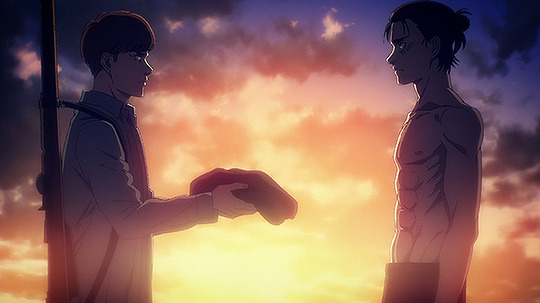
The poll closed with 176 responses. Thank you to everyone who participated!
Please note that these are the results for the Manga Readers’ poll. If you wish to see the results for the Anime Only Watchers’ poll, click here.
--
RATE THE EPISODE 172 responses
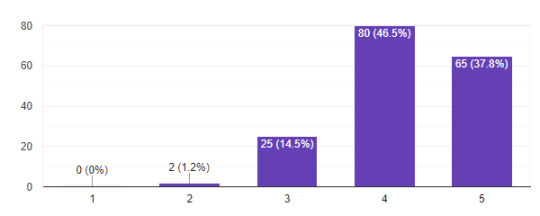
This week’s episode keeps up the high mark of the previous episodes, with 98.8% of respondents giving the episode a score of 3 or higher (overwhelmingly 4s and 5s). Nice!
It was aight.
It's cool
8.5/10
great!
Very rocky imo in terms of animation, as the cracks are beginning to show but overall look like the backgrounds and music choices were top tier.
Really good episode, I was disappointed in the jacket scene but it’s not the end of the world
loved it
It was overall a great episode I loved it.
🔥🔥🔥
WHICH OF THE FOLLOWING MOMENTS WAS YOUR FAVORITE? 174 responses
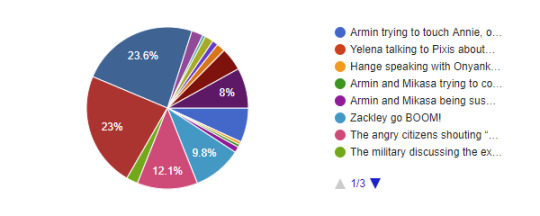
46.6% of respondents overall were most excited to see Eren meeting up with Floch and the others, with 23.6% of those respondents favoring the scene of Eren putting on his jacket specifically. 12.1% most enjoyed seeing the angry citizens shouting out the Survey Corps motto. 9.8% were thrilled to see Zackley’s death animated. 8% were psyched to see Pieck in disguise at the end, and 6.9% most enjoyed the moment where Hitch caught Armin red-handed trying to touch Annie’s crystal.
YOUR REACTION TO EREN PUTTING ON HIS JACKET? 171 responses
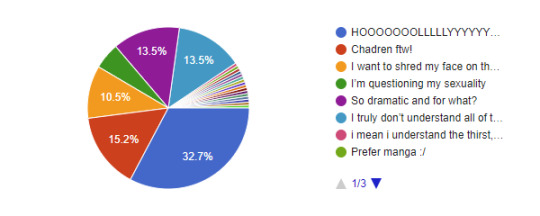
Eren putting on his jacket was a scene many obsessed over when it first appeared on page and many looked forward to seeing it animated. Most of the response choices were focused on various forms of swooning over Eren and his abs. Some (13.5%) stated that they didn’t really understand the dramatism and some others (another 13.5%) simply stated that they did not see much in Eren outright. We’ve gotten a lot of write-ins about comparisons to the pre-animated trailer shot of said scene. More on that in a later question.
i mean i understand the thirst, but eh
Prefer manga :/
The trailer did it better
Meh. Better in the trailer and the manga.
TF was that? Well it's still good in its own way.
YES! YES! YES! YES! Y E S!
both "HOOOOOLYYYYYY 😳" and "so dramatic and for what?"
Trailer/Manga shot was way better
Manga shot/trailer version are way better. Dissapointed
Trailer looked better :(
Mappa only made Reiner thicc, why Eren is so frain he has 1,85! He is so strong in the manga
I don't care
Manbun.........👀
He can have my babies anytime 😌💅🏻
Not as sexy as advertised; that’s okay, though.
That scene looked weird af ngl. It looked better in the trailer 😔
Me after THAT eren scene: 🤰🏻🤰🏻🤰🏻
Eren makes my dick rise
ON A SCALE OF 1-5, HOW HAPPY ARE YOU NOW THAT WE APPEAR TO BE GOING BACK TO LEVI AND ZEKE’S PERSPECTIVE NEXT WEEK FOR A BIT? 171 responses
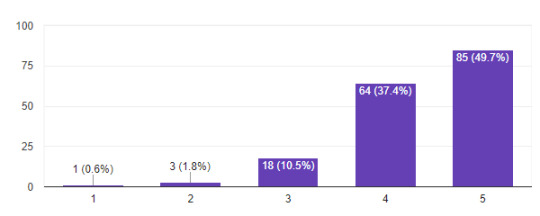
Levi and Zeke’s chemistry has been the subject of praise for many, so it’s no wonder that 87.1% of respondents are rather excited to get back to seeing Levi and Zeke again. Wow!
ARE ARMIN’S FEELINGS FOR ANNIE GENUINELY HIS OWN? 173 responses
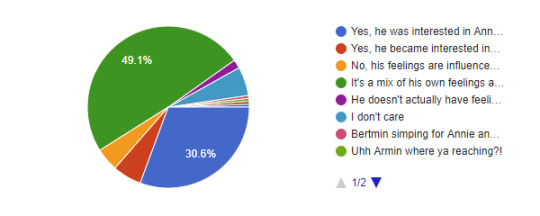
Armin’s feelings for Annie have been looked at under a microscope for a variety of reasons, which is why we’re asking if you believe that his feelings for her are genuine. A plurality, 49.1% think that they’re a mixture of his feelings for her, as well Bertolt’s. Slightly less (30.6%) believe that Armin’s feelings for her existed since before any of the recent developments. Only a select few believe that he either became interested in her post-timeskip or that his feelings are solely influenced by Bertolt. One person doesn’t think Armin has any feelings for Annie at all. And a few others just don’t care.
Bertmin simping for Annie and that apparently being enough for her to start considering him as boyfriend material is the fucking worst. I hate this shit. It's made me like both characters considerably less.
Uhh Armin where ya reaching?!
He was interested with her even before it was revealed she was the Female Titan and now that he has Bertholdt's memories, he sympathizes with her too and wants to understand her more so maybe Bert's memories intensified his feelings
His feelings for Annie are mostly his own. Bert's feelings might be in there a little, but the feelings are still Armin's.
CONTINUITY ALERT! EREN HAS HIS HAIR UP IN A BUN IN YELENA’S FLASHBACK. THOUGHTS? 173 responses
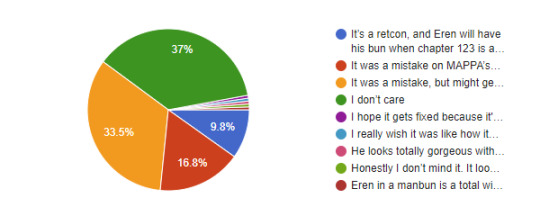
Uh-oh, Eren’s hairstyle moment. It would appear that there might be a continuity error with Yelena’s flashback and whatever that means for the timeline. A slight plurality (37%) didn’t seem to care about this, actually. But 33.5% appeared to believe that it was a mistake on MAPPA’s part that might get fixed in the BluRay version of the episode. 16.8% also believe that it was a mistake, but don’t believe it’ll get fixed. 9.8% think that it’s actually a retcon and that Eren’ll have the man bun when Chapter 123 gets adapted in Final Season Part 2.
I hope it gets fixed because it's bugging me.
I really wish it was like how it was in the manga. Eren looks good with his hair down in his 16-17-year-old phase. Despite the error, it wasn't a deal breaker for the episode.
He looks totally gorgeous with his hair up in a bun, please let this mistake be
Honestly I don’t mind it. It looks great either way.
Eren in a manbun is a total win for me!
WHICH PIECES OF INFORMATION MISSING FROM YELENA’S ADMISSION IN THE MANGA DO YOU WISH WOULD HAVE BEEN INCLUDED IN THE ADAPTATION? 163 responses
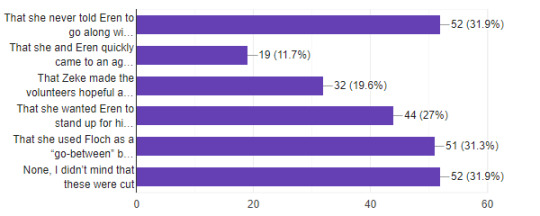
As with almost all dialogue-heavy chapters in this series, there are cuts. In this episode, these cuts mostly affected the conversation between Yelena and Pixis. The most yearned for cut material was Yelena never telling Eren to go along with the plan and Yelena saying that she used Floch as a “go-between” between her and Eren. Others also noted missing lines about Yelena wanting Eren to stand up for himself, Yelena stating that Zeke gave the volunteers a hopeful future and the idea that her and Eren came to quick agreement. The plurality (31.9%) however, didn’t seem to mind any cuts.
WHAT ARE YOU OVERALL FEELINGS ABOUT SOME OR ALL OF THE AFOREMENTIONED DETAILS BEING CUT? 161 responses
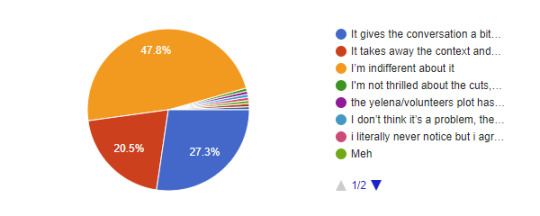
There is often a sort of expectation to have everything (or almost every) line from the manga adapted in the anime, so it’s interesting to see how people react to that sort of stuff. An almost 50% of respondents stated that they didn’t really care about the cuts, whereas smaller handfuls of respondents stated that the cuts either took away from the characterization of the conversation, or from the context and timeline-building purposes.
I'm not thrilled about the cuts, but I understand MAPPA can only fit so much in on each episode, so I'm okay with it
the yelena/volunteers plot has always been wonky and hard to follow
I don’t think it’s a problem, they need to cut certain things.
i literally never notice but i agree that it makes it harder to piece things together
Meh
It might seem for anime watchers that Yelena didnt do much, and Floch and Zeke that did the most part, in their own plans. Floch to betray and Zeke in predicting Eren wouldnt be on his side in some way. Yelena helped Zeke a lot to where he arrived in the rumbling
All of the above
ZACKLEY WALKS OVER TO HIS TORTURE MACHINE IN THE ANIME BEFORE MIKASA ASKS WHAT WILL HAPPEN TO EREN, RATHER THAN GLANCE OVER AT IT AFTER HER QUESTION. WHAT DO YOU THINK ABOUT THE CHANGE? 170 responses
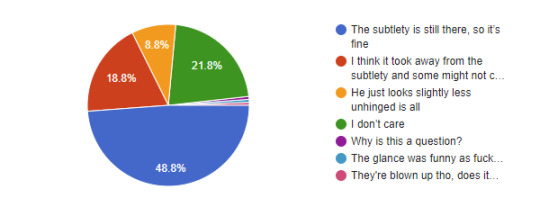
There was a partially comedic insinuation in the manga that Zackley thought about strapping Eren to his “art piece”. The insinuation is possibly still there in the anime, but in a different form. So we asked how you felt about it. Slightly below a half (48.8%) stated that they thought the subtlety was still there. 18.8% thought the subtlety was lost with the small change and 8.8% believed the change made Zackley seem less unhinged. 21.8% really didn’t care at all.
Why is this a question?
The glance was funny as fuck in the manga, but might have been awkward to pull of in the animation
They're blown up tho, does it even matter?
DID EREN KNOW ABOUT THE BOMB? 170 responses
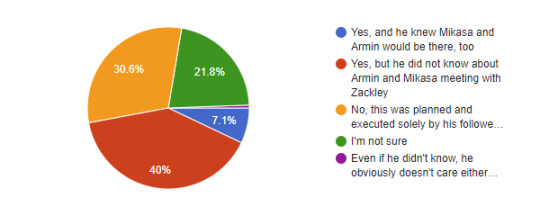
Whether Eren truly knew about the bomb is a bit unclear to this day and with how it endangered Armin and Mikasa. A plurality (40%) believe he knew about the bomb, but did not know about his childhood friends meeting Zackley. Slightly less (30.6%) think that Eren did not know about either the bomb or AM meeting the Artist. A minority (7.1%) does believe that Eren knew about both the bomb and meeting and 21.8% simply aren’t sure!
Even if he didn’t know, he obviously doesn’t care either way.
THERE IS SOME DEBATE ABOUT WHETHER EREN’S JACKET SCENE WAS BETTER ANIMATED IN THE PROMOTIONAL VIDEO OR IN THE EPISODE ITSELF. WHICH DO YOU CHOOSE? 170 responses
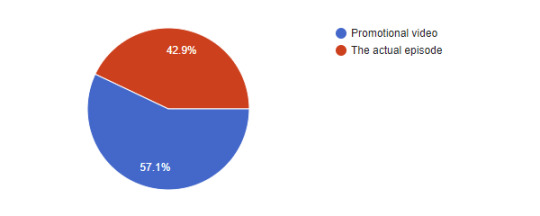
Here we go… The elephant in the room… Which Eren abs scene did you prefer? The Promotional video or the actual episode? A somewhat slight majority (57.1%) seemed to like the version seen in the promotional video more than the episode itself versus the ones who preferred the episode’s style (42.9%).
THE EPISODE MARKS THE BEGINNING OF FLOCH’S ACTIONS AS THE VOICE OF THE YEAGERISTS. HOW ARE YOU FEELING ABOUT IT? 170 responses
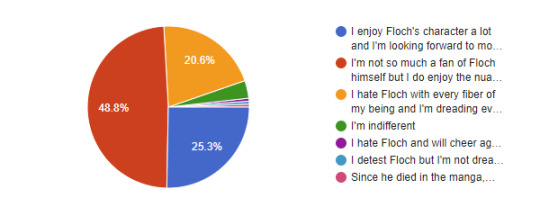
Floch has always been a controversial character and the developments seen post-time skip have not been any less debatable. You may floching love him or floching hate, but he’s here and he’s staying for a while. A plurality (48.8%) notes that although they may not personally be a fan of the character, they truly do appreciate the nuance his appearance gives to the story. Just over a quarter (25.3%) stated that as big fans of the character, they’re looking forward to all the screentime the Flochster will receive. In contrast, 20.6% despise the man and his questionable haircut and are also dreading the showcase he’ll soon receive.
I hate Floch and will cheer again when he dies, but I enjoy his character.
I detest Floch but I'm not dreading all the screen time he'll take up.
Since he died in the manga, my hatred for him has cooled down somewhat now that I'm watching the anime.
I am once again asking for you to shut the fuck up, Floch.
WE KNOW NOW THAT EREN DID CONSPIRE WITH FLOCH TO BETRAY ZEKE TO ENACT THE RUMBLING. STILL, DO YOU BELIEVE HE DID IT BECAUSE HE HAS THE SAME BELIEFS AS FLOCH, OR WAS HE JUST USING FLOCH AND THE YEAGERISTS AS A MEANS TO AN END? 161 responses
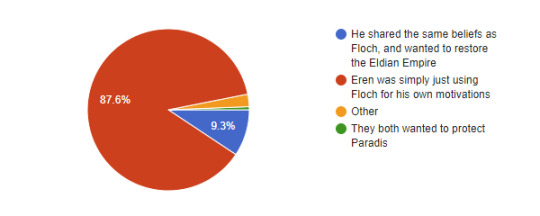
An overwhelming amount of respondents (87.6%) stated that they believe Eren never truly saw eye to eye with Floch and his ideology and that Eren was simply using Floch as a means to an end. In contrast, 9.3% truly do think that Eren was ideologically similar to Floch and the “New Eldian Empire”. A select few thought you couldn’t just say one way or another.
They both wanted to protect Paradis
DO YOU THINK IF THE YEAGERISTS, BESIDES FLOCH, KNEW ABOUT THE FULL SCALE RUMBLING BEFOREHAND THAT THEY WOULD WILLINGLY FOLLOW EREN? 167 responses
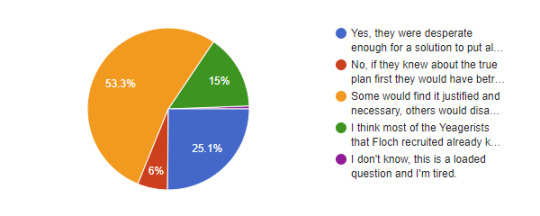
The majority (53.3%) feel that the Yeagerists would see a divide if they knew beforehand that Eren wanted to initiate the rumbling, with some sticking around for the cause and others possibly leaving because it’s too extreme. 25.1% believe that they all would have fully supported the rumbling in the name of their own survival. 15% believe that every Yeagerist already knew about the plan to commence the rumbling, and only 6% feel that they would most certainly have betrayed the Yeager brothers (and Floch) if they had known.
I don’t know, this is a loaded question and I’m tired.
DO YOU THINK THAT, IF THE STORY ENDS PEACEFULLY, MIKASA WILL HAVE A ROLE TO PLAY IN HIZURU? 170 responses
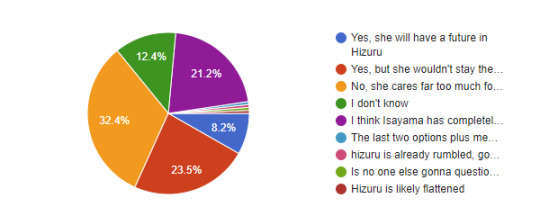
While this plotline may not be going anywhere in the manga (or so it seems), the reminder of its existence is brought to light again as we revisit these older moments from the manga. 32.4% feel that Mikasa wouldn’t leave Paradis behind to start a life on Hizuru. 23.5% think that she wouldn’t leave Paradis behind, necessarily, but will still have a role to play in Hizuru. 21.2% think it doesn’t matter because Isayama has completely discarded (or forgotten) about this plotline. 12.4% don’t know what to predict (if anything) and only 8.2% believe that her future lies in Hizuru beyond the main storyline.
The last two options plus me not caring. ¯\_(ツ)_/¯
hizuru is already rumbled, gone, but she will continue the azumabito clan in paradis
Is no one else gonna question Kiyomi's hair being sucked into her skull??? HELLO MA'AM???
Hizuru is likely flattened
WHICH SCENE FROM THE PREVIEW ARE YOU MOST LOOKING FORWARD TO? 171 responses
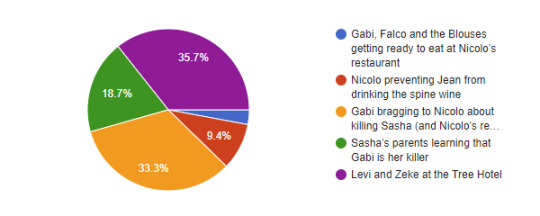
Episode 72 has already broadcasted as of the completion of this poll. For scenes that were most anticipated, 35.7% were most looking forward to seeing Levi and Zeke’s interaction in the forest. 33.3% most looked forward to Niccolo leaning straight from Gabi’s mouth that she is Sasha’s killer. 18.7% highly anticipated the Blouses learning about Gabi killing Sasha, and 9.4% were looking forward to Gabi/Falco and the Blouses gathering at Niccolo’s restaurant. Only a small amount were looking forward to Niccolo protecting Jean and Connie from drinking the wine.
ADDITIONAL THOUGHTS ON THE EPISODE?
Man the animation was gonky
no levi </3
So many faces of Niles are weirds !
Let hange aloneeeeeeee and happy, please
I have no word for this, but I feeling good
Shit is getting really real now!
Everyone talking about Eren’s abs and I just wanna say the music in that scene was amazing!
I loved how it was all neatly put together and fast moving
Armin looked so good. Homie walked from point A to B and i SCREAMED. Thank you.
i wish they included eren's warhammer escape from the prison, besides that solid episode all around, the people chanting 'dedicate your hearts' gave me chills
I can't stand Hitch at all but MAPPA made her really pretty. Re: The jacket scene The trailer version was pretty much identical to the manga panel. But I liked the version that made it into the final episode too. People have been so ridiculous about MAPPA ""ruining everything"" this season, they should stop watching if that's how they feel. I thought Eren looked great and found the sun shining on his abs funny. The scenery was better in the episode, imo. I hope they don't cut Jean's line about booze not caring about what race you are. Lmao
Meh. It's not bad of course, I just find the rythm weird and I don't really feel many emotions watching the episodes. And I was so thirsty for the jacket scene, and it turned out weird too.
Mappa pls stop drawing eren like shit he is gorgeous in the manga
MMGH SOON!! LET'S GOOOOOOO
You friccin moron, you just got zooked!
i miss eremin </3
Wish they had shown how eren used his titan powers to escape.
I'm so not looking forward to the controversy that's gonna be reignited during the EMA talk scene. I'm actually dreading it, but we'll finally get the Levi vs Beast Titan scene so I'll be fine
112 will destroy ships
I felt the animation was flawless as usual but the script was kinda boring, I expected more of these aspects: -Yelena, it was bland with the cuts -Hange, they cut something I cant figure what in this Yeagerists coup act that turned her scenes a little bit lacking? Idk something -Again the soundtrack in the episodes is so silent. The only episode so far I liked the ost beyond the Opening and Closing themes is Reiner episode. I miss the melodrama of Witstudio osts
Eren putting his jacket on in slow-speed whilst talking at regular speed is fucking trippy
Just happy to see Hitch!
It was slow and mainly plot driven. I enjoyed it despite the changes.
goddamn is that a hella well-animated explosion
more abs please
Great episode. Really ridiculous how many people overreacted about the jacket scene. It's ok to perfer the way the trailer did it but to those who say Mappa is ruining the adaptation because of minor things like this, calm down.
I wish the jacket scene was better But over all the ep is pretty good
Boring, but then again so was this phase in the manga.
I really like the VA they chose for Onyankopon! His voice is very warm and genuine, which suits his character well
The sunset was so aesthetically pleasing
yoooo just read ch. 138 and im crying in da club :(
These MAPPA episodes have been a low point for me. I’m trying to enjoy them because I love this story but it feels like a chore.
WHERE DO YOU PRIMARILY DISCUSS THE SERIES? 161 responses
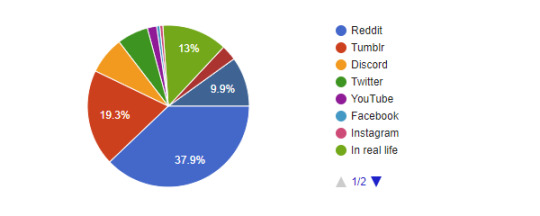
Thanks again to everyone who participated!
13 notes
·
View notes
Text
PROCESS, ONE: A READER’S JOURNEY
“The essays in this book were memoir until they couldn’t stand to be memoir anymore.” —Leslie Jamison
Had I read that quote even only six months ago (the book to which she refers is her much-lauded personal essay collection The Empathy Exams), I wouldn’t have known exactly what it meant.
How can a piece of writing evolve from memoir? In terms of simple, unvarnished truth-telling, I thought the memoir, as a genre of literature, was pretty much the vessel. Yet here a case is being made for something that sounds like the opposite: it seems one can go beyond even the once terminally-regarded memoir.
Let me think about this further, about my confusion. Maybe my framing is off. Maybe it’s not an issue of evolution or reduction. It’s not that the personal essay is somehow purer than the memoir, as far as autobiographical writing is concerned. The issue is not one of authenticity. It’s about application, or even misapplication, that the quest for truth for which one naturally uses the data of one’s own life could, depending on the circumstances, be more appropriately undertaken in a different genre. The two genres are merely looking at different subject matter. They’re examining completely different lifeforms on the slides, but they’re using the same authentic microscope, as it were.
I relate to the sense of frustration in the Jamison quote, that there’s a feeling that the mission she started out on—writing a memoir—became so inadequate for the real task at hand that it became unbearable, that the pressure of working under a false guise gave way to a different form of transmission.
The memoir became a personal essay collection. It had to. The questions she was exploring could not be undertaken by simply telling the story of one’s own life. Personal data was necessary for the full picture. But she needed other sources, the experiences of others, the realities of phenomena outside of her normal experience, even as they were phenomena that ultimately she ended up relating to in a deeply intimate manner. In her collection, she let us into those experiences, and then we were able to relate, by dint of her fearless storytelling and personal excavations.
Now I’m getting it: a personal essay is fixed on some question and that is what drives the exploration. Personal, say, autobiographical, details are needed for the exploration, and this can vary depending on the subject. But the focus is the external question. That is the different lifeform on the slide. It’s about the question being pursued.
I.
But first, a look at where I started on this journey, with the memoir itself.
The memoir as a work of literature was my singular focus while I was crafting my book proposal a couple of years ago. Simply put, it was what was on the table. Owing to my provenance as a musician and an actor, and my express interest in writing about my life, the genre of the memoir naturally became a thing for me.
So I dove into acquainting myself, not with examples of celebrity memoirs or memoirs by politicians—perhaps the two most popular varieties—but with examples of the finer possibilities in those genres which—big surprise—happen to be written for the most part by writers. I found myself falling in love with the exercise of memoir writing, as opposed to, say, the gratuitous voyeurism that is often offered by the popular variants of the genre.
For me, what became valuable was the quality of the writing; most of the time I was reading the life stories of people with whose work I had, outside of the memoir being read, little to no familiarity. These windows into life were captivating in their own right, these portals into raw experience, the possibilities of narration within the genre of nonfiction, the enlightened self-awareness made evident in sculpting large-scale timelines of one’s own life.
----------------------------------
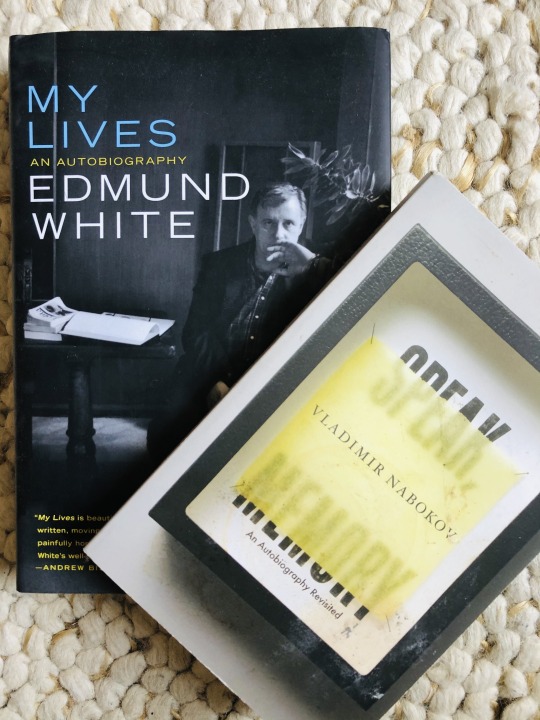
It’s difficult for me to overstate the degree to which these two books have influenced me thus far.
Nabokov’s memoir is well-known. It’s a work of literature in its own right. It is a great example of the possibilities of the memoir to accomplish something other than realism: the whole thing is a kind of Proustian meta-narrative of his childhood and abrupt departure from Russia after the revolution, like a dream of family life written down. Mary Karr, in The Art of Memoir, heads her chapter on this book, “Don’t Try This at Home: The Seductive, Narcissistic Count.” Indeed, the book reads somewhat Transylvanianly, a bold, exotic yarn full of strange characters unfurled for an audience unfamiliar with that way of life. It reads as alluring and dark, and, yes, quite vampiric. But it is also profound and gorgeous.
While it’s not really a memoir, more of an autobiography, and also not often regarded as exemplary of the form, My Lives, written by Edmund White is an incredible tour de force of portraiture of the most important people in his life, his therapists, his parents, his lovers, his friends, his subjects, they all get a chapter dedicated specifically to them. Imagine knowing a world-renowned painter who decides he wants to do a string of portraits of the most important people in his life and you are one of them. That’s what this is, in literary form. It’s less a story of him than of these people, but, by the end of the book, you, of course, end up knowing a lot about him. His ability to make you see the things that he is looking at, in a very concrete, physical way—the curves of a body, the angles of a face, the ambience of a train station—is unparalleled in my view.
Is there a difference between an (a) autobiography and a (b) memoir?
I think the difference is about scope. The autobiography is explicitly a functional genre that attempts to document a person’s entire life. It is a biography that is written by the person whose life is being written about. It does not usually try to invoke any literary devices and is intended to serve as an ancillary to consumption of the subject’s work outside of the autobiography. It is a kind of “reader” of the subject’s life. It’s main purpose is not to be written well (although if it isn’t it is a grave mistake), it is to convey the near entirety of the subject’s experience on earth.
By contrast, good writing is a bit more called-for in the memoir; otherwise the whole premise falls apart. The memoir, in carving out a specific “slice” of a person, either a period of time or some type of encounter or some activity that they always do, is explicitly intended to amplify and interrogate aspects of being. In this way, the memoir has more potential for inspiration and edification irrespective of the reader’s interest in the subject’s life outside of the memoir. This, to me, is the crucial difference.
For the most part, I am not explicitly a huge fan of the work of the writers below. But their memoirs have touched and inspired me. I don’t think I would have all that much interest in reading the autobiography of, say, Joan Didion. (I might, I can’t be sure, of course). But my point is that I’m not looking for her autobiography, whereas there’re a lot of Didion fans out there that would be waiting for said autobiography.
In this way, autobiography is a kind of fan service, whereas the memoir is a thing unto itself. It is a work of literature written for the purpose of refracting aspects of being alive. To appreciate that type of writing you need not be familiar with anything else that person has done on this planet, anymore than that it is necessary to be familiar with Herman Melville’s entire oeuvre in order to love and appreciate Moby Dick.
It was with the consciousness of the memoir’s self-sufficiency, the irony of its ability to communicate, in its more specific mode, even more broadly than the supposedly more capacious autobiography, that I continued my exploration of the genre and began taking notes for the writing of my own memoir (which is now a personal essay collection, but more on that later).
----------------------------------
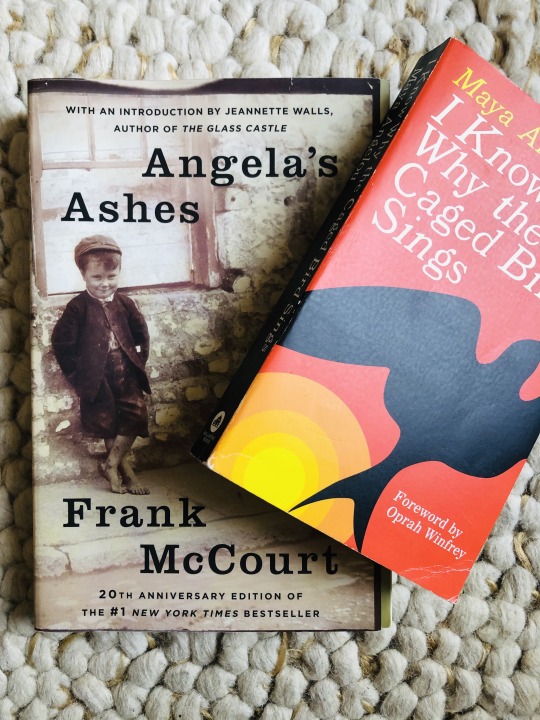
Two classics of the genre, here.
Many of us have read Maya Angelou’s book in high school. Both focus on the same thing: a period of time starting from birth and leading just up to late adolescence. Both are written like traditional first-person stories with beginnings, middles, and ends, and, were it not for our knowledge of their source material, might easily pass as romans a clef. I also think that both are examples of “misery lit,” although I think that that genre is overly hip and reductive for Angelou’s work, which is about so much more than just her misery. But they both focus on their childhood traumas in such a plain, unadorned, simple way, it is shocking and, for those of us struggling with these same issues, healing.
----------------------------------
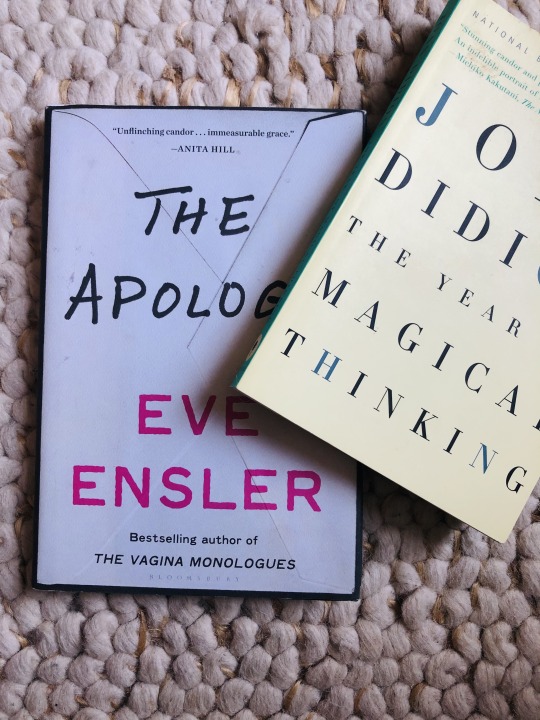
The Apology and The Year of Magical Thinking are examples of how the memoir can focus to a degree of incredible specificity. Both focus on pain but are concerned with different parts of experience. Didion writes only about one year of her life, while Ensler writes about almost the entirety of it, but with a focus on a single, prevailing experience. Both are harrowing in completely different ways and both are exquisite in the way they lift up their struggles to find meaning and truth, things that pertain to the reader’s own experiences and which he or she may also come into touch with in reading these books. They truly are gifts in that regard.
In a manner of speaking, these two books are like two, very long, book-length personal essays. They rigorously explore and interrogate their premises and do their best to extract whatever possible that is meaningful out of that exploration.
----------------------------------
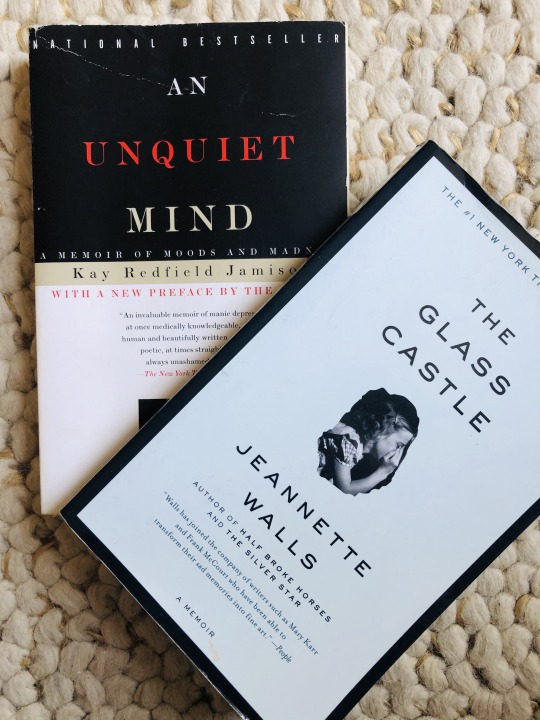
More “misery lit”! I actually don’t mean to be reductive in saying that. Both of these are fabulous stories concerning completely different encounters with mental illness and they are far beyond some hipster term of art. But there is a lot of memoir writing out there that explores the darker ways some of us were brought up and I don’t think there’s anything wrong with simply naming a certain type of writing that courageously explores how our childhoods might have been compromised.
In The Glass Castle it’s about her father’s mental illness and in An Unquiet Mind, it’s about the author’s own journey discovering and treating her bipolar disorder. Walls writes her story very much like it’s a novel, like Angelou’s memoir, and, also like Angelou, she writes it from the perspective of her child self and it is a compelling account as a result, full of tragic innocence and complicated encounters far beyond the reach of a child to properly grapple with.
Jamison’s book is very clinical, although she recounts her episodes frankly and shockingly and really brings you in to her subjective experience of insanity. These two books—not to mention Eve Ensler’s—have given me the courage to begin exploring my own encounters with mental illness and childhood trauma and to commit those experiences to writing.
----------------------------------
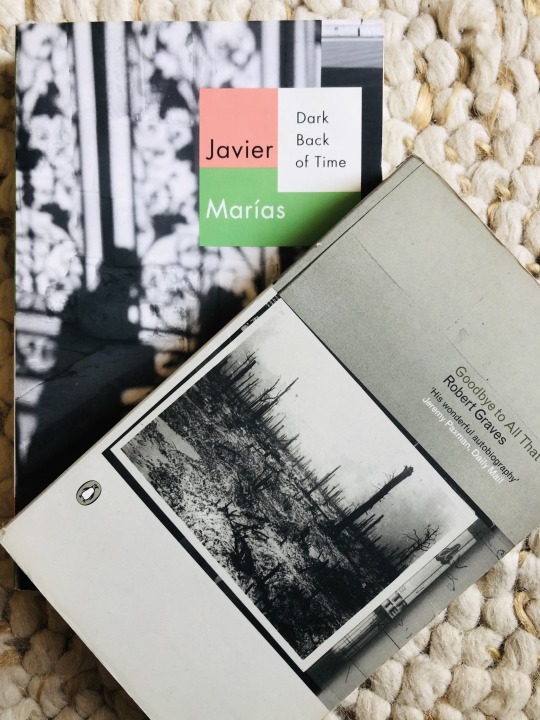
As I continued to research I started coming upon a very interesting type of memoir, the experimental memoir. That’s really interesting I thought. How does one write a memoir as a form of experimental art?
Not that this one is expressly experimental, but Robert Graves’ book is slightly off-putting in that fecund, experimental way: the bulk of it is dedicated to his experience in the trenches and it’s told with grit and harsh realism. But it starts with his schooldays and ends briefly, and curiously inconclusively, with scenes of fatherhood and tutelage. It’s a rather unique rendering of a life. Towards the end he admits that his original idea was to use the notes that he took on the frontlines for writing a novel but changed his mind after realizing that he would be desecrating his experiences and his memories and his sacrifices by layering a plot and storyline onto them. He then decided to write it simply as a factual account.
Dark Back of Time, however, is a full-on experiment in autobiography and it is always slipping in and out of reality, imagination and historicization. He spends a large amount of time writing about an old soldier who died accidentally on a hotel balcony in South America but he gets to this through talking about the reactions that his peers in Oxford had to one of his novels which they suspected made use of their lives. Truly an eye-opening experience to read autobiographical material refracted in this way.
----------------------------------
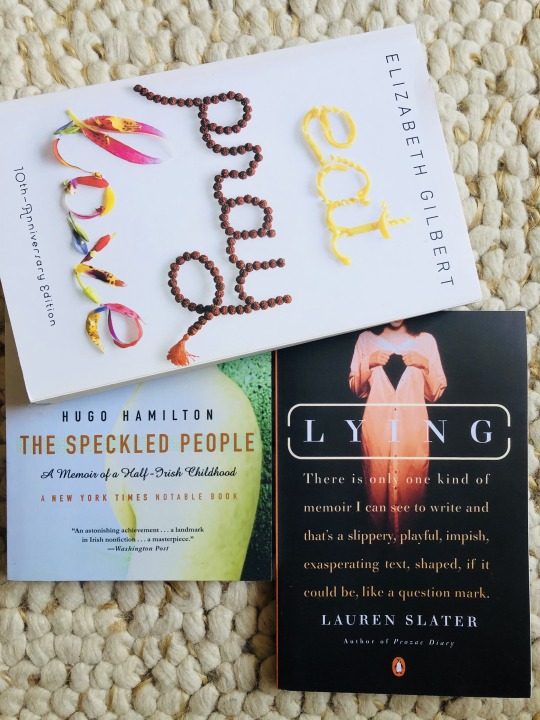
I haven’t read these three yet. They are “on deck,” as it were. Eat, Pray, Love needs little introduction, obviously. The Speckled People was highly recommended by a fellow writer and Lying came up in an online search as a prominent example of the experimental memoir.
At this point, it was already clear to me that I was writing a different kind of memoir than any of these examples. I realized that I was in effect writing personal essays without knowing it. I knew very early on that I wanted to eschew responsibility for an overarching narrative of any sort. I wanted to commit myself to specific topics that could be covered discretely in one chapter each. When I read the Graves’ passage regarding the desecration of his time on the battlefield, I thought of my own “war stories” and thought similarly that trying to give them a plot, while not exactly a “desecration,” would feel unnatural and inauthentic. What was feeling natural was to pick separate experiences in my life and devote a chapter to those I felt were strong enough for further elucidation. The time I got stuck on a mountain overnight with a friend. The shock of coming to NYU. The decision to leave the music industry. There were so many other parts of my life that seemed to deserve specific treatment in this way. I naturally started coming upon essay collections as a result.
II.
I took an online course by Alexander Chee called, “How to Write an Essay Collection” and afterwards it became much clearer what kind of book I wanted to write. I read about half of his reading list for the class and, along with the volumes I’d already dug into, I learned what a personal essay really was and what it wasn’t, and knowing this difference demonstrated to me quite clearly that the book I was writing wanted to be an essay collection in the truest sense of what an essay really is. The Leslie Jamison quote at the top of this blog post became true for me as well. My memoir could no longer stand being a memoir and had become a personal essay collection.
During the class, Alexander Chee recounted an irony regarding his own personal essay collection. He said that he found it curious when readers of his book would tell him that they found so much of him in it. “There’s actually not very much of me at all,” he said; and he mentioned this in order to illustrate what a personal essay collection is and what it isn’t. The reason why there’s not that much “of him” in his essay collection, nor, for that matter, why there isn’t much of any author’s life in any of their personal essay collections, is that a personal essay, despite being “personal,” is primarily geared towards externals not internals. “Pity the personal essayist,” the author Sloane Crosley writes in her New York Times review of Jamison’s latest essay collection, Make it Scream, Make it Burn, “fated to play with a reader’s tolerance for that most cursed of vowels. Too many “I”s and you’re self-absorbed; too few and: Where are you in this piece?”
Self-absorption as a liability in writing is understood enough, though, when it comes to autobiographies and memoirs, the liability becomes unavoidable and, if anything, necessary. We read those books exactly for the purpose of the big drop into an author’s psyche, willingly diving down the subjective abyss, basically swimming in “I”s (the best ones allow us to do this gleefully).
Not so in a personal essay, where the restriction on egoistic license holds. And yet: how do we include and implicate ourselves into the topic? without stepping on traps of self-absorption? This is what Chee was talking about when he said that there wasn’t much of him in his essays: not that he didn’t implicate himself in his narrations—he very much did—but that he skillfully observed this precarious balance.
That balance is undertaken quite differently depending on the author (and in my synopses of the collections I’ve read recently I’ll try to speak about how they’ve assigned “percentages of self” into their essays, what the “lean-to-fat" ratio is, for example, when “fat” could be understood as the strictly autobiographical portion of the essay). It can also vary according to the essay. In some cases it’ll be necessary to fully implicate oneself. In others, perhaps only a passing mention of the author’s impression of the events is needed. But there’s an essential aspect to what makes for a great personal essay, irrespective of ratios of personal to objective, that Charle’s D’Ambrosio captures beautifully in the introduction to his own essay collection:
My instinctive and entirely private ambition was to capture the conflicted mind in motion, or, to borrow a phrase from Cioran, to represent failure on the move, so leaving a certain wrongness on the page was OK by me. The inevitable errors and imperfections made the trouble I encountered tactile, bringing the texture of experience into the story in a way that being cautiously right never could.
This is kind of a Copernican revolution to me. I mean, it had never really occurred to me that you could be wrong and that would be a good thing. In writing I had always striven to make sure that I didn’t insult researchers, journalists, experts and scholars by misrepresenting the truth. Yet, here was basically a license to get it all wrong and admit it on the page and have that be a virtue of the writing.
What this tells me is that what remains key in the personal essay is not some authoritative stance, but the very uncertainty of the perspective, and how that might invite opportunities for a much more intimate relational structure with the topic matter on the part of the reader. This isn’t about ingestion (of data, of info, of ideas, etc.) but about contact. I see that as being very similar to the relationship between reader and author in a memoir, this premium on relation. The only difference—and for me, a very consequential one—is that the primary target of a personal essay’s sight is not the self qua self, but some implication with the content of reality on the part of the self. That intersection is what fascinates me more at this time than simple self-narration.
In this way, a personal essay can kind of be like a stop sign, a signal to halt the gyrating (mostly online) world, with its hyperlinks and ads and other pseudo-references. In fact, in his brilliant collection Proxies, Brian Blanchfield takes on this very task and turns the internet off when writing each of his essays in the collections. In order to take solace within the much more subjective account housed within the pages, an account at once open and tentative, based as it is in doubt, and hermetically sealed, shunning the greater world’s insistence on certification and realism, the essay becomes a prismatic utility for investigation, where perspective and subjectivity are king and certainty and objectivity are actually limiting.
The memoir offers something very direct to the reader: the author’s own struggle with, or journey through, some issue or period in life. The author is the chief protagonist in the drama, the star of, say, the cinematic adaptation of the book. The issues swirl around the protagonist but the camera stays trained on him or her. What I started to notice was that my mental gaze was always scudding away from the protagonist (me) and over to what else was in the frame. And so the personal essay as I began to learn about it became a much more appropriate vessel for these concerns, even as I knew that I would need to implicate myself in the action, keep myself in the frame. Striking that balance in a way that is both specific to me and my experiences and yet observant of the proper limits of the genre, so as not to veer away and “regress” back into memoir, has become my chief objective with each of the essays that I’ve been writing.
----------------------------------
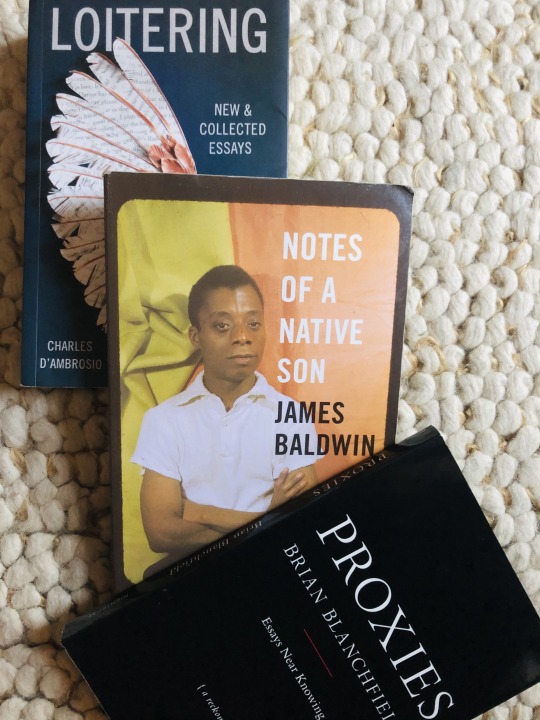
These three collections might be my bible for this project. Each are very different in style and application, but each is similar in that joyous experience of reading a paragraph and being so stunned by the insight that one has to turn the face away from the page for a moment (or two) to let it sink in. Baldwin is, of course, the king of this sort of thing. There were times while reading his essays when I actually had to straight up close the book and put it down in order to absorb what was going on. The title essay which is about Harlem, his father, and his early awakening to the depth of his country’s racism, is perfection on both the level of content and form. It does what an essay does best: leave you with the unequivocal residue of human feeling twisting around the grander issues with which that essay is concerned.
Each essay, in all of these volumes, is like a discrete nugget, a piece of writing, contiguous, open and alive, that can be read and reread, like an oracle you visit throughout your life, which, using the same words, speaks to you anew each time.
Ambrosio’s essays are absolutely nimble and virtuosic; his language is muscular and sinewy; his sentences are lean and long and you can ride them effortlessly and when you finish them and their paragraphs, you are left with an image of a truth that was planted in your sight without you knowing. It’s an exhilarating experience.
Blanchfield’s essays are a revelation of subjectivity. This volume was part of Chee’s reading list and I can’t express enough gratitude for having been directed to it. Perhaps Blanchfield is the master of nesting the autobiography within the confines of an essay. When he toggles between the external and the internal, you don’t notice it. It’s effortless. His ability to tell a giant story in one paragraph is inspiring. The tone and delivery is somewhat sacral, he’s a poet, after all. But it is also delicate, graceful, poised and elegant. And deeply personal. How someone can title an essay “On Frottage” and turn the reader’s attention to the true significance of the topic—AIDS and the gay scene in the 80s and 90s—and all of the social significance intertwined in it, along with implicating himself in a nakedly autobiographical way, is beyond me, but I am happy to be in the audience for it.
----------------------------------
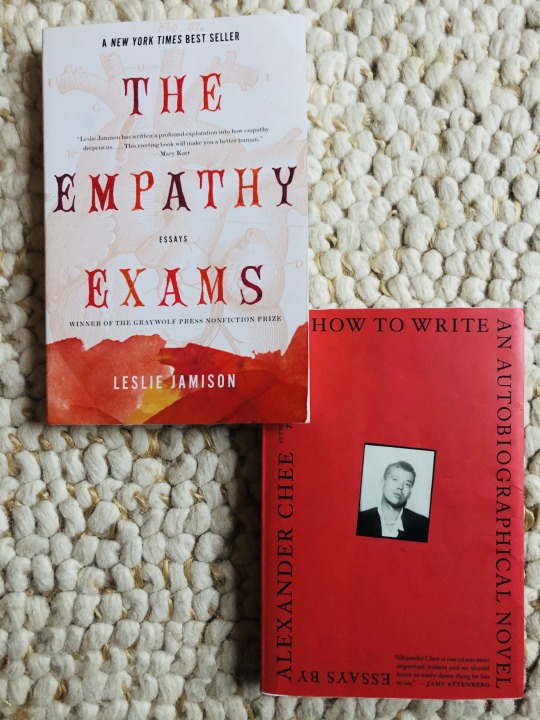
What I love about these two collections are their stealth and form. Their stealth comes from how they read, not so much as casually but as without artifice or adornment, and how this aspect lets the reader’s guard down, only to have some extremely penetrating conclusion arrive at the end of each essay, in a manner that the more plainspoken style did not necessarily anticipate. Chee’s prose particularly comes across as either supremely and dryly witty or as modest plainness, but when you finish one of his essays the takeaway is anything but those things; it is profound. Jamison as well. As for their form, they tend to do some adventurous things. One of Jamison’s essays uses a kind of diagram of storytelling which she learned in a writing class to “tell the story” of a traumatic episode involving a horrific episode of violence she experienced in South America. The essay is called “The Morphology of a Hit.” It’s a perfect example of something else that I really love about personal essays which is their ability to take leaps in form when that form enables a type of storytelling that otherwise isn’t possible. Chee does this very thing in a somewhat humorous essay, the titular one of this volume, which is just a long list of life hacks and writing tips. I’m really grateful for the insight that this man has given me into the writing process. My copy of his book is signed, as I first became aware of him at a reading of his with Edmund White at NYU which my good friend invited me to. So I’m very grateful to that friend as well! He also introduced me to Edmund White so it’s a double whammy!
----------------------------------
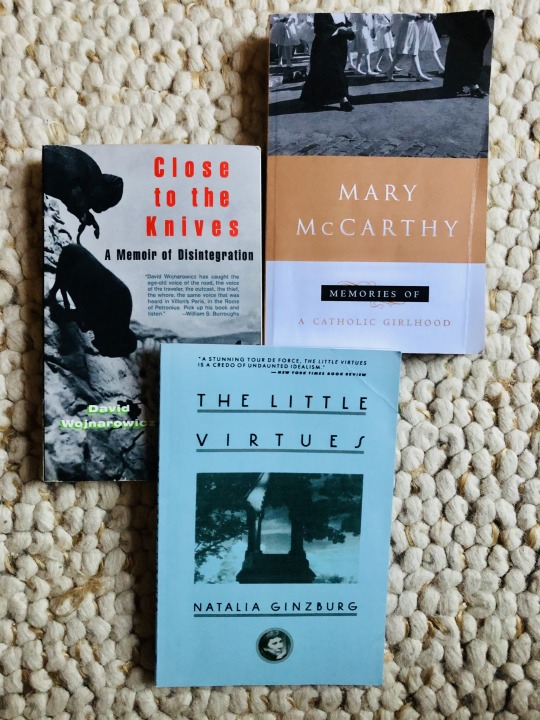
I would’ve never encountered these collections of my own volition without their inclusion on the reading list in Chee’s course, but I’m very happy that I read these. McCarthy’s essays are quite old, dating to the 50s and 60s, I believe, when they were originally published in The New Yorker. They’re all centered around her childhood years, either living with her grandparents or in an orphanage and they are remarkable portraits of intimacy and observation. The same with Ginzburg’s collection, although she writes in a much more enigmatic style. What inspired me most about her essays was how simultaneously aloof and vulnerable they are: she has a way of, say, writing about England, without ever even mentioning the name of the country, yet contriving a recognizable and incisive portrait of it, all from the vantage point of her own experience of the country during a certain time. Finally, there’s really nothing quite like Wojnarowicz’ book. It’s slightly Beat in tone, sometimes surreal and ecstatic, and then progressively more plainspoken and political. But it is all so very raw and pulsing with the heat of experience and desperation and anger. Wojnarowicz was an incredible artist, a sculptor and photographer and he lived in the East Village of the 80s and reports from the frontlines on the AIDS crisis. His work bears the stamp of a deeply tuned in artist confronting the hypocrisies and injustices of his time.
----------------------------------
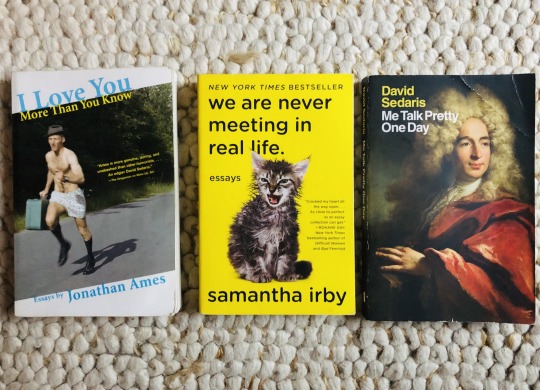
I put these three together mostly because these collections are explicitly comedic, although each has its own manner of using humor to communicate a deeper message. Jonathan Ames is well-known as a very funny novelist and the creator of the TV show Bored to Death. His essays are very short and very direct. There’s almost no commentary and he just narrates the events. The approach of leaving room for not knowing is very noticeable in his work, as he often qualifies his observations with humility and openness. The work comes across as very tender as a result. Irby is laugh-out-loud funny. I don’t know how she does it but she has a way of sending herself up and making fun of herself and her limitations that is both funny and painful at the same time. Commercialism, body positivity, and personal achievement are only some of the themes that are explored through that lens of self-effacement. Her ability to put herself under the most lacerating gaze of the authorial microscope and coming out the other end of that examination as a strong individual is unparalleled. I consider this volume must-reading material. In terms of exquisite construction and intelligence I would have to put Sedaris up high on the list, though his work is popular enough and his collections prodigious enough that his reputation for that kind of writing needs no further illustration here.
----------------------------------
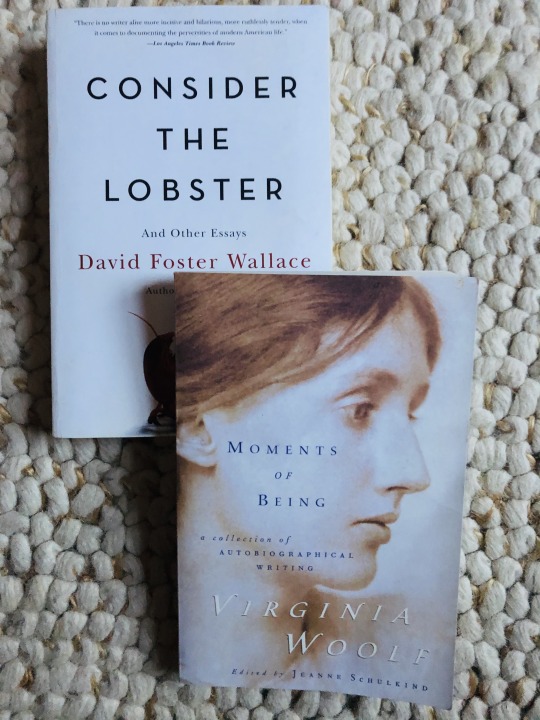
Virginia Woolf is popular as an essayist for collections published much earlier than Moments of Being, such as The London Scene. The essays here are actually very raw and unedited and so very sprawling, though obviously of high literary quality. She wrote them down like diary entries and then they were found after her death. They feel similarly to McCarthy’s essays in their naked observations of early childhood and family life. Juxtaposing this collection with DFW’s Consider the Lobster is a bold choice on my part, but it’s for the purpose of elucidating my previous point about that delicate “lean-to-fat” ratio I spoke about earlier in this blog post. Woolf’s posthumous collection is “all fat,” one could say, in that her focus is almost exhaustively on her own life and personal upbringing and subsequent marriage. These essays are basically memoir writing in the guise of the personal essay. DFW’s essays, by way of intense contrast, are almost “all lean,” in the sense that he spends almost no time talking about his personal life. The closest he gets to that is his essay on 9/11 where he goes over the details of where he was when it happened. The rest are what you’d expect from the author: penetrating accounts of the subtleties and hidden motivations of the cultures and people he investigates. He is basically like the most intelligent wartime journalist where his “wars” are the John McCain presidential campaign of 2000, the AVN Awards Ceremony, or the Maine Lobster festival.
----------------------------------
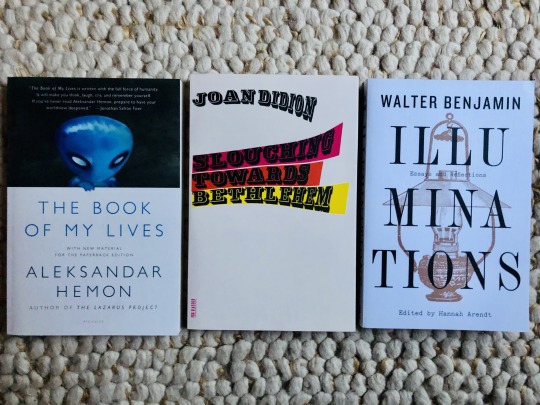
I have yet to read these collections but I’m very much looking forward to them. Hemon’s essays are about his upbringing in the war-plagued Balkans of the Nineties and subsequent emigration to the US. Didion’s basically needs no introduction as its de rigeur for essay writing. I’ve included Benjamin’s because of his critical insight. He’s not writing about his personal life, but his gifts for analysis will be really helpful to be exposed to for anyone undertaking the task of writing a personal essay. I have not included a picture of Susan Sontag’s collection Against Interpretation because it’s on order, but that one is also on deck. As are two other collections not pictured: Mary Oliver’s Upstream and Rebecca Solnit’s Hope in the Dark.
#charlesdambrosio#leslie jamison#james baldwin#vladmir nabokov#edmund white#frank mccourt#maya angelou#eveensler#joan didion#kay redfield jamison#jeannette walls#javiermarias#robert graves#elizabeth gilbert#hugohamilton#laurenslater#brianblanchfield#alexander chee#david wojnarowicz#mary mccarthy#natalia ginzburg#jonathanames#samantha irby#david sedaris#david foster wallace#virginia woolf#walter benjamin#aleksandar hemon#writing#memoir
17 notes
·
View notes
Text
Content Creator Interview #6
Hello again and welcome to our sixth interview. This time, it’s the turn of @ashockinglackofsatin to put @sunken-standard ‘s writing under the microscope. Together they chat about the early days of the Sherlock fandom, how music can influence writing, and why the I Love You scene helped end sunken’s own great hiatus.
For those who don’t know me: I am @ashockinglackofsatin on tumbr, satin_doll on AO3. My test subject...erm, sorry - interviewee - is the notorious sunken_standard, probably most famous for her two epic, novel-length stories Longer Than The Road That Stretches Out Ahead and Fumbling Toward Ecstasy, which can be found on AO3 (along with her other wonderful stories) and should be required reading for anyone aspiring to write fanfiction.
You should know, first off, that I’m crap at doing interviews, which I discovered years ago when I had to interview musicians and various personalities as a job. I didn’t last long at that job.
So here is Kat’s Idiotic Interview with @sunken-standard.
satin_doll: You’re very good at writing Sherlock’s emotional cluelessness without making him seem like an idiot or an ass. Can you talk a little about the way you see Sherlock’s character that allows you to do this?
sunken_standard: Thank you :D So the answer to this is going to carry through to some of the other questions, but basically, I write Sherlock as a version of myself. I feel a kinship with the character, a highly intelligent person surrounded by idiots and so, so frustrated by it, but even more frustrated by his own brain and the inability to control it. Probably autistic, just like I'm probably autistic (and I don't want to get into it but I'm not trying to co-opt an identity here or anything; I've tried to get a diagnosis and found out that's just not possible with my current healthcare options).
Anyway, one of my probably-autistic things is being hyper-aware of other people's emotions, but also having trouble identifying them and the appropriate responses. At times I do lack empathy, like I honestly can't understand why someone is feeling what they're feeling because I wouldn't feel that way in the same situation and it doesn't make sense. Sometimes I can empathize so much that it's overwhelming and I just kind of short-circuit, especially when it comes to grief or loss, and I end up being insensitive or just not saying or doing what a normal person would.
So basically, I approach his responses to other people's emotions the way I would my own, only stripped of female socialization and self-awareness.
satin_doll: How much do you draw on your own life and experiences in your fics?
sunken_standard: For scenarios and specific scenes, not a lot. For emotional and sensory experiences, more. I haven't done very much or lived to my full potential, so it's not a very deep well on either account. Every now and then anecdotes or details creep in (like Mars Cheese Castle and the “call me Daddy” during sex thing [which, for the record, was skeevy as fuck irl]), but most of it just comes from nowhere or stuff I saw on TV.
satin_doll: Both “Longer than the Road…” and “Fumbling Toward Ecstasy” are novel length stories. “Road”, however, is written without breaks/chapters. Did you ever consider breaking it up into parts or chapters? How hard was it to keep it all in one piece and how long did it take you to finish it?
sunken_standard: When I write, I usually just start and then go 'til it's done or I burn out. I got through three or four chapters' worth of FTE (and was on the verge of giving up until maybe_amanda convinced me not to). Since the story wasn't nearly finished and I wanted to start putting it out into the world (mostly because I have no patience, but also because I knew there was a window to stay relevant and a large number of people were looking for a longer, meatier [cough] post-TFP fic), I decided to start posting what I had and just write as I went because I was, in hindsight, probably hypomanic and I was keeping a good pace at that point.
I dunno, I think there was a lot more of that long-format thing happening in fic back then, where you'd have a 40k piece that only had breaks because of the word limit per post on LJ.
As far as how long it took, I don't remember. I know I started it February of that year and had probably a good 75% of it finished (all written at a tear, over the course of probably ten days or so, because when I was still smoking actual cigarettes I could and did do 3-5k words/ day), but then I dropped it and went on to try other ideas. I went back to it when those other stories fizzled, and I finished it in maybe another 2-3 weeks with editing and beta reading. I had some real problems with the ending and it was never good enough for me, but I just got to a point where I was sick of it and it was good enough.
So basically, it's harder for me to work in chapters than it is one long piece. There's more discipline to a chaptered work; each chapter is its own story, in a way, and each one needs to end on a certain kind of beat. I still don't feel like I have a knack for it, and I think if I did anything long like that again I'd have to write most of it without breaks and then shoehorn them in where I could later on.
satin_doll: You took a long hiatus from Sherlock fic after S2, and came back for S4. What was it about S4 that sparked your writing again?
sunken_standard: I don't really know. I mean, the ILY was a big thing, but I think S4 gave me more to work with for the kind of things I write (all the angst and inner monologue) than S3 or TAB. I had mixed feelings about S3. I didn't like Mary much for a long time because she was one of Moffat's women (and anyone who's seen my tumblr knows how I feel about that), but I finally unclenched after a while because I like Amanda Abbington a lot and Mary was preferable to Sarah Sawyer (who I'm more ambiguous about now, but really didn't like for a long time because there was something about her that I read as smarmy, though now I see her reactions as more subtly uncomfortable and kind of like “what's going on/ this is weird/ John's a nice guy but is everything around him always this weird?”). Anyway.
I did try writing a bit after S3, but I never finished any of it; I didn't really feel like there was a place in the fandom or much of a community at that time, either—at least, not like what I had been used to from the early days. The tribe that existed wasn't my tribe (any of them). I think I need a certain degree of shared enthusiasm to motivate me to keep writing. Like, I have a lot of ideas for fic in other fandoms, but they're dead or never existed in the first place. And I know I'll have some audience for the small fandoms and people will read and kudos and everything, but there's no one around to geek out with or bounce ideas off of, so it just isn't as appealing. If I'm going to be miserable and alone while writing something, it's going to be something I can at least make money off of, y'know?
satin_doll: Do you edit as you go or finish the story first and go back over it to edit?
sunken_standard: Edit as I go. When I get stuck, I break that cardinal rule of writing and go back over what I've written and nit-pick it to death. It's a bad habit, but at the same time, small changes have led to big developments in the course of the story later on. I mean, I think sometimes this is why I have so many unfinished things, but I've tried just writing through and that doesn't work for me either. Once I get to the end of something, I've already made most of big cuts and done a lot of the reworking, so the beta polishing isn't as labor-intensive. I'm one of those people that when I feel like something's finished, I don't want to have to go back to it again. And if I didn't edit as I went, it would kind of feel like redoing the whole story and that's extremely unappealing to me. It's kind of like baking—it's always better if you clean as you go, rather than waiting until the cake's out of the oven to do the dishes and put stuff away (which I do when I'm low on spoons, but it ends up seeming like double the work).
satin_doll: Do you proof it yourself or rely on someone else to proofread it for you? I’m talking technical details here, proofing as opposed to simple beta reading.
sunken_standard: Mostly proof myself, since I edit as I go (and proofing is inevitably part of that when the mistakes just jump out). My beta catches everything else (and she's amazing; I misuse words and just legit don't know spelling differences for a lot of things [stationary vs stationery] and I'm not great with grammar and prepositions because I'm an ignorant fucker with no education).
satin_doll: When did you first start writing? When did you first discover that you COULD write?
sunken_standard: I remember writing stories as a kid, but I burned them all when I was a teenager so I don't even know what most were about or anything. I do remember that I wrote one when I was in like 4th or 5th grade that was ST:TNG self-insert fanfic and I think the plot was me working with Data to bring Lal back. I know it was Data, because I had a huge crush on him as a kid. I really thought I could grow up to write ST:TNG novels at that point.
And as for CAN write—jury's still out on that one. Ask my 12th grade English teacher, who laughed in my face when I told him I was thinking of pursuing English so I could be a writer. But before that, I had some other teachers that used to give me A+s on my creative writing assignments (despite all the spelling and grammatical errors). In 11th grade, I had a really great teacher, Mr. Lansing, who turned me on to the good parts of American lit and really encouraged me to read (and write) what I liked, not just what other people told me I had to. He encouraged me when I applied for the Governer's school, too. (The Governer's School is this program in PA for kids who excel; it's like a summer camp for the elite nerds. They have a bunch of them, each for different areas—math, science, medicine, I think one that's like history/ government/ civics, and then one for the arts. For creative writing, they take a total of 20 kids—10 for poetry and 10 for prose. I tried for the poetry category and made the first round of cuts and went for a regional interview (with about 50 other kids, so like maybe 150 kids state-wide); long story short I didn't make it. I was the first alternate, meaning if somebody couldn't attend, I would get their spot. #11 out of 10. I was so crushed, because it basically reinforced what I'd been told by other people—I was a big fish in pond too small to even piss in and there were always going to be people better than me. I was already mostly checked-out when it came to academia and aspirations; after that there was just really no point to keep going.)
Anyway though, I did write bits and pieces here and there even after school, thinking one day I'd get my shit together and write my own Confederacy of Dunces and then off myself (it's still a viable plan). Then, in 2008 I was recently unemployed and everything in life was shitty, so I wrote a big happy-ending fic for The Doctor and Rose. It was kind of the right bit of media at the right time that inspired me. More about that later though.
satin_doll: What/who do you think has had the biggest influence on the development of your style?
sunken_standard: I've been asked this before, and I always feel like I'm a little pretentious and I trot out the same names (both fanfic authors and book authors), but I had a realization a while ago that I'm always missing one person—Vonnegut. I think he's got this kind of no-bullshit way of saying things that still manages to be poetic and delicate and that's what I most aspire to.
I think a lot of my style is influenced by film, too. Some influences are probably Todd Solondz, Richard Linklater, Kevin Smith, and John Waters, as far as the way I approach the reality within the story. I think I tend to focus on a lot of the same things—the weird, the mundane, the mildly uncomfortable—but I don't go nearly as far in any direction. I think even the way I string scenes together and the shifting of focus within my scenes between action, dialogue, and inner monologue are influenced by cinematography. I always say I'm just transcribing the movie in my head, so I mean, there's bound to be some kind of influence.
satin_doll: You’re noted for the banter between your characters, humorous and otherwise. Do you have rules/profiles for characters that establish their voices for you? Are there things, for example, that you think Sherlock or Molly simply would never say/do or would always say/do? How structured are these characters in your head when you start writing?
sunken_standard: It varies slightly from story to story/ universe to universe, but I think I have patterns for the banter (and I have a different set for Sherlock and John, and Sherlock and Mycroft, but there are common threads throughout). As for comedy, it's not quite straight man/ funny man, but I tend to default to Sherlock being more literal and deadpan and Molly being more expressive and emotive. I use the scraps of the dynamic the show's given us and just build on that. It's kind of formulaic, actually: Sherlock does a not-good thing (degree of severity varies), Molly reacts with a blend of annoyance and amusement while going along for the ride.
I have a kind of mental file for things I think would be out of character for each of them, but sometimes I like to try to find a way to get to one of those things and slip it into a fic organically. One of the reason I liked doing the one-line prompt fics so much was that so many of them could easily have been intros to the kind of fluff that makes me gag; I'm no fool, though, and I love me some low-hanging fruit, so I just adjust it to my tastes. I'm a never-say-never kinda gal. Mostly.
That being said, there are a lot of things that I think would take a lot of doing to make them be in-character. I don't think they'd ever use pet names for each other unless it was through gritted teeth or with at least a bit of irony (like how I used “yes, dear,” in FTE, and I think in some of the universes in Ficlet Cemetery). I can't see Sherlock ever doing housework unless it was for a case (though dishes and sanitizing surfaces are an exception, because both those chores are tangent to the kind of cleaning up after oneself one does in a lab setting, and imo that fits with his logic). I can't see him being very affectionate in public, except under rare circumstances when he might do an arm around the shoulders or a guiding palm to the small of the back.
And as for structure, I think they all start with the same scaffolding, but in every new universe they get draped slightly differently according to variations in backstory or tone or genre or whatever. Or like, they're already sculpted, but the lighting changes. I think that as I write, they take on different nuances and acquire more depth, though. Like it wasn't really until a few chapters in to FTE that I got a fuller picture of the Molly I was writing, even though I had the rough idea of her backstory from pretty much the beginning. Same with Longer Than the Road, too. As I come up with details of someone's past, I experience those scenarios and it makes me rethink and fine-tune everything about them in what I've already written, and adds more texture as I keep going.
satin_doll: You’ve listed a playlist for “Longer than the Road…” Do you write to music? How much does music inspire your writing? Does every story have a playlist?
sunken_standard: It's funny, but I don't listen to music nearly as much as I did even 5 years ago. Not sure why, honestly, maybe something to do with my mental health and overstimulation? So I don't write to music much anymore. Not every story has a playlist or songs attached (I don't think any of the FC stuff does, at least not in any significant way), but it seems like my best work is inspired by music in some way.
FTE didn't really have a soundtrack, but I listened to a lot of the music I had in common with the version of Molly that I was writing—very 90s alternative and pop rock. Lots of Pulp (which I picked as Molly's favorite band because I think they're Loo's favorite, or one of her favorites). For the proposal, I had “Dreams” by The Cranberries on a loop as I wrote. There's just something musically about that song that's full of anticipation and the wavy kind of guitar (I don't know the music terms and it's been so many years since I was into anything instrument-related that I'm not even sure how the sound is made, like a whammy bar or wiggling their fingers on the frets or whatever but anyway) just has this kind of wavering emotion that makes it feel like it's on the cusp of something. And also it's the big romance song from every coming-of-age thing ever, and so just hearing it is like an auditory shorthand for breathless, adventurous romance, at least for women of a certain age (namely, my age, and I'm only a year younger than Loo/ Molly). There was another scene—I can't remember what it was without rereading the fic—that I spent like three days listening to nothing but “The Way” by Fastball. It might have been the thing with the drink testing and then the sex on the sofa and the cake baking. (As an aside, I just started listening to the song and immediately got hit with a sense memory of night-wet spring air blowing in my window, because that's what the weather was when I was writing to this and it gives me a weird yearning pull in the back of my throat, like nostalgia almost but something else in it. Like, did you ever hear a pop song that taps into some deeper part of the human experience, both musically and lyrically, and you just feel like there's some universal truth in it that's too much to totally grasp? That's how I feel about both of those songs. Anyway.)
Another story that had a few songs attached was Stainless, Captive Bead. Radiohead's “Creep” was what they were listening to in the tattoo parlor, and a lot of the sex bits were written while listening to Nine Inch Nails' “Closer” (look, if it's set in the 90s and there's fucking in it, I'm going to find a way to relate it to “Closer,” because that song is just dark sex and angst set to synthesizers and a high hat).
Also, sometimes when I write I listen to ambient noise stuff, cityscapes or rain or whatever fits the tone of the piece and my mood. I can't listen to anything for too long, though, because I get listener fatigue and I burn out faster.
satin_doll: Have you ever considered self-publishing your stories as a book or series of books?
sunken_standard: I've tried to file off the serial numbers on the Girlfriend series, but it was harder than I thought it would be so I back-burnered it. I still like to think that one day I will, it's a life goal, but if I put too much pressure on myself I only make it worse and nothing gets done.
satin_doll: You seem to have a detailed backstory for every character in your stories, from Janine to Molly’s mother. Do you work these out beforehand or do they just happen in your head as you write?
sunken_standard: Both? I kind of touched on it earlier, but I usually have an idea of the backstory, the bones at least, and then as I write it gets richer. I have multiple headcanons for every character, so I just start off with one of those. Like I have five different families for Molly, all things I was coming up with when I was writing other stories. Hell, I've got like five different Uncle Rudys (most of them highly unpleasant and most likely triggering).
I have a habit of just sitting and thinking about a character, like “what would make them this way?” armchair psychoanalysis stuff. And if I can establish a plausible-sounding backstory, I have a better foundation for introducing non-canonical traits or details. I think that's the downfall of a lot of fic authors—they just write a canon character as they would an OC and expect us to play along without demonstrating any internal logic. Maybe I'm just picky; there's certainly an element of that, too.
satin_doll: How detailed is the story in your mind before you start writing it? Do you work from plans and outlines with every story?
sunken_standard: It all depends on the story. Sometimes I have a whole series of detailed scenes just waiting in my head to be written out. Sometimes I only have one thing and I just keep going. I say I use an outline, but it's not a proper outline. More like a collection of notes and bullet points of what I want to happen and what kind of beats I want to hit. I usually keep it at the bottom of my working document so I don't have to switch to another doc to look at it if I need to.
satin_doll: Where does a story begin with you? What constitutes the “urge” to write? You once mentioned (in a comment reply I think) that you know the ending of the story first and then write the rest of the story to get there. What do you do when a story goes off track? How do you get it back to the way you planned it, or do you even try to do that?
sunken_standard: (I don't know why my document formatting went tits-up here, so I'll answer 1 & 2 both here)
So stories are a visceral kind of thing. I always have ideas. Seriously, give me a theme or a title or something and I can spit out a summary and details in as long as it takes to type it out. But actually crafting prose (can I sound more pompous?) is best likened to the urge to poop. Classy, right? I said it was visceral. Really though, it's that same kind of state of heightened awareness/ arousal (in the strictest medical sense of the word, not sexual arousal), something is happening and if it doesn't things are going to get weird and I'm going to be very uncomfortable for a very long time. Also, like pooping, if it's not ready, no amount of grunting or straining is going to make it happen, and it might even make it worse in the long run. As you can tell, I've been very, very constipated for the last year.
Anyway.
Stories going off track... a lot of the time I just let it happen because it's taking me to a better place than where I thought it was going to end up.
satin_doll: Quote from you: “I spend way too much time thinking about who Molly is as a person. Writing porn and comedy both have their appeal, but I really like sitting down and thinking about what makes any given character tick and how they might feel about what's happening around them. 30s and single has so much baggage to it, even if all the women's magazine articles and whatever-wave-we're-up-to-now feminist thought pieces say it's a myth or a stereotype or whatever. It's a truth we don't want to be true because it's not fair. I mean, it's not the thing that solely defines any woman, but it's there, just like cellulite and brand new and worrying moles and our favorite brand of whatever suddenly being discontinued (or significantly changed) because some marketing person decided it was too 'old.' But anyway, such is life. And I like putting that in fic.”
Do you write character studies to use as a reference for your stories, or just wing it for each individual piece?
sunken_standard: The character study is dead, isn't it? Like, as standalone fic. Never see them anymore, which is a real pity. I used to write them (or, well, start them, heh) before I took a break from writing/ fandom, mostly to try to get some of my headcanons down in some kind of usable way. But I haven't really written a character study (in prose, at least) since 2012 or so.
So when I write, I keep two documents open—the working copy that's a first-through-final draft and a “notes/ cut bits/ things to work in somehow” document. In the notes document I usually keep any character details (backstory or how I want them to react to something later, whatever). There are themes I go back to over and over, like a cluster of traits I reuse in some fashion because I think they fit the character (Mycroft and disordered eating, Molly as a middle child in some fashion, John as the child of alcoholics, etc.), so a lot of that just lives in my head. Any bits of characterization specific to a story go in the notes doc for that story, while any generic thoughts or something that I think I might want to use later gets stuck in another document full of random ideas, snippets of dialogue, jokes, AUs I'll never write, that kind of thing. I've got a few of those docs from different writing periods. They're mostly just a way to externalize a thought so I don't lose it; I hardly ever go back to them for anything.
satin_doll: What was your first involvement with fanfiction? Where did it all start?
sunken_standard: I started to answer this in another question; basically, fanfic's been in my wheelhouse in one way or another since I was a kid (Star Trek novels are fanfic, period). I discovered fanfiction back in the days of eXcite searches and webrings while looking for translations of Inu Yasha manga scans; I stumbled upon an English-language fancomic/ doujinshi called Hero in the 21st Century and it was so well-written, funny and poignant and well-researched I was just drawn in. I still think about it and the author's other works to this day. I did pick at the idea of writing myself, sometimes even put down scenes or outlines and did hours of research, but never did the thing.
And then, in 2008, the stars aligned and I started a thing. Journey's End spawned a ton of Doctor Who fic, and that was good, because I could just kind of slip mine in there and I probably wouldn't get a lot of criticism or attention. So I wrote like two chapters without any idea of how it was going to end, and I submitted it to Teaspoon and an Open Mind (which was the Doctor Who fic archive at the time; it was curated/ moderated and where you went when you wanted to read something you knew would be good, or at least conform to certain standards, unlike The Pit [which is still garbage today]). And I got rejected. My grammar and spelling were awful (I didn't even have spell-check in whatever program I was using) and they said the whole thing had good bones, but I really needed to work on the English before they'd look at it again. Getcherself a beta, they suggested, and I think they had a forum where writers and betas could connect. So I got myself a beta and she stuck with me for like 30 chapters, answering questions and keeping my characterization on-track and basically re-teaching me the rules of written English. I tried to email her a few years ago to thank her again, but her email bounced back. Her name was Julia and if she sees this, thank you Julia. You're a wonderful person.
Anyway, I wrote lots in that fic universe for like 2 months, then got another job and tapered off. I abandoned it completely after a year. Life got in the way of a lot of things, and the next time I was really inspired to write anything was a couple years later, for Supernatural. I only put it on my LJ, never posted to a community or anything, and no one read it. Literally, I don't think the post got any hits at all and for sure no one commented. I sometimes think about putting it on AO3 just because. And then Sherlock happened and here we are.
satin_doll: Do you think writing fanfic has hurt or hindered your original work? Why or why not? (that looks like a high school test question - sorry!)
sunken_standard: Lol @ test question :D
I'm not really sure, tbh. On one hand, I only have so much creative energy—it's definitely a finite resource, and a scarce one—and devoting it to fanfic diverts it from any original work. On the other hand, all writing is practice. The only way to improve is to keep doing, no matter what it is. So in that sense, fanfic's certainly helped me to find a comfortable voice and a prose style that works for me. There are still problems to solve, figuring out the best approach to a scene or story from a technical standpoint (stuff like tense and perspective and all that), so I'm always learning something as I go. Mixed bag, really.
satin_doll: What was it about the Sherlock/Molly dynamic that got you started on a piece like “Longer Than the Road…” What did you see there that made you want to explore it in such detail?
sunken_standard: So I always talk about how Sustain was my come-to-Jesus moment with Sherlock and Molly. Here's something I've never told anybody, not even maybe_amanda (because I was kind of ashamed, but not for the reasons people might think): before ever reading Sustain, I started a story that was Sherlock/ John and Sherlock/ Molly. I had it roughly outlined and a few pages written, but I just kind of lost the feeling of it and it was starting to get problematic for character motivations, yada yada, so into the scrap heap it went. It had a passing similarity to Sustain because of a platonic-sex-for-pregnancy element (hence why I never talked about it), but the major difference was that it was going to end up as a kind of polyamorous arrangement, Sherlock loving both of them and having a kind of co-parenting triad. In mine, John wanted a baby, and Molly wanted her own baby, and Sherlock thought “best of both worlds!” and why do IVF when you can write awkward angst-fucking instead. But yeah, I never finished it.
Anyway, I always saw something there, but I couldn't make it work in a way that was consistent with my own characterization of Sherlock until after Series 2. Even in Series 1, he looks at her with a kind of fondness and a sort of bewilderment that just lends itself to nerds in love. At the time (and even now, tbh), I kind of attributed that to BC having a crush on Loo (and oh man do I have theories, which are gossipy and gross and not the kind of thing I usually even bother having opinions about, but have you listened to the S1 commentary and some of the interviews around that time? there's something more there) and that kind of just spilling over onscreen and it working for the editor because it makes BC look sexy.
I mean look, I make no secret of the fact I started off shipping Sherlock with John almost exclusively (though I'd read just about anything), and after S1 aired it was just a different time. I get really annoyed when people talk shit about the pairing and the people who still ship them, because most of them weren't even in the fandom at the time and didn't have the same experience as the OGs. When Series 1 aired, hardly anyone knew who BC was, and Martin was just the guy from The Office and some other shows that were kind of unremarkable; most of the fandom was composed of old-school ACD Sherlockians and a few stragglers (like me) that got there from Doctor Who or were just general mystery/ thriller fans that got sucked in. We had a different perception of it because we weren't led into it by Star Trek or Hobbits or MCU; the characters didn't have that baggage attached for us. A lot of us already had a perception of Holmes and Watson as some shade of gay, so it was no great leap to see the very obvious romance (and yes, they all called it that in interviews at the time) onscreen as a romantic one. Martin, when asked, said basically that he'd play the next series (S2) however they wrote it, and if romance was there he'd go down that road. Whatever, I don't need to defend it because people think what they think anyway.
.
Anyway, getting back to the actual question instead of a million tangents and rants, I think I saw a lot of the things that have since become like backbone tropes of the pairing (even in canon, with the whole “alone, practical about death” thing). Their interactions in S2 were great; everything hinted at more than what was on-screen. And I really liked the idea of exploring the dynamic that was pretty much already there, as far as Molly having both a crush and self-respect and Sherlock suddenly having to rely on this person (that he picked because she was reliable to begin with) who's a friend, but also kind of a stranger in the way that a lot of the people we consider friends are (at least, friends made in adulthood; work-friends, church-friends, club-friends, gym-friends). Past that, I really saw the potential for character growth stemming from their interactions, but not like her humanizing him or whatever; both of them gaining insight about themselves, with the other person (and their relationship) as a vehicle for those realizations. I think I could have done better on that front, but hindsight blah blah.
satin_doll: How familiar were you with the Sherlock Holmes character before the BBC series aired, and what made you want to write about him?
sunken_standard: So I wasn't very familiar at all. Just what was in the general cultural lexicon, maybe a few episodes of the Granada series on PBS as a kid, a few of the stories that I just couldn't get into when I tried to read them because I hate Victorian prose (hate it, everything about it, I won't read anything written before 1920 or so because I just hate it [Wilde being the singular exception, but I even get bogged down by him]). Oh, and the RDJ movie, which wasn't really Sherlock Holmes to me, but just like a Victorian-era action movie. After S1, I just devoured canon (though, full disclosure, I still haven't read all of it, probably only about 80%), then moved on to other adaptations and canon-era fic and pastiches, read a bunch of extra-canon material on the internet. So as far as that goes, I'm very much a poseur and newbie in the greater Sherlock Holmes fandom. At least I did my research?
Anyway, it really took the modern adaptation and BC's performance to make the character resonate with me. The aspects he chose to play up—the frustration and impatience and frantic mental energy—just hit a nerve. He really channeled the “gifted” experience (which I suspect was just a lot of BC himself bleeding through). Finally I could use a fictional character to bemoan how stupid everyone around me was and sound like a complete asshole and be completely in-character! The heavens smiled upon me.
Really though, I was initially attracted to how cerebral it was and how smart the fandom was overall. It was the early fandom (and I mean early, like days after episode 1 aired) that drew me in, at least to a participatory (vs. consumptive) level. Lots of very clever, very educated, very queer people having these deep, insightful discussions about everything (sometimes only tangentially related to the show). When I did start writing, I didn't have to dumb anything down; the challenge was to sound smarter than I actually am. And, I mean, I got to dredge up a lot of my own emotional baggage from being a perpetual outsider, which is always cathartic (and probably not very healthy, long-term, because it's not resolving anything, just exploiting myself, but that's a can of worms).
satin_doll: Are you more drawn to Sherlock or Molly as a character, or both equally? Why?
sunken_standard: Sherlock, I think, for the reasons described in the last question.
I don't generally identify with female characters in fiction, since my own identification as female is tenuous (and in general they're poorly written and poorly realized, but that's another story). I mean, I can draw from my own experiences as a (mostly) female-shaped person with female socialization, but I have a hard time intuiting feminine and it's harder for me to write a “normal” woman.
Paraphrasing something I read in an interview with another fic author I admire, writing a woman is always a self-portrait, and how much of yourself do you really want to reveal? Since I don't know how to woman correctly, I'm always afraid I'm going to slip up and hit the wrong beat for what a normal woman is and end up ruining the characterization. I do manage to channel a lot of my own frustrations with men, relationships, being a single and childless woman over 30, and the patriarchy into Molly's character, though.
I mean, don't get me wrong, I really love Molly (and always have—I was one of the first to use her as a main character and not just a punching bag or a punchline). I love her sense of humor and her job and her fashion sense, all of it. She's not one-dimensional. It's just easier for me to write Sherlock than it is to make decisions about who Molly is.
satin_doll: You are “internet famous” for Longer Than the Road (rightfully so!) What about that story do you think is so affecting for fans? How has “Road” influenced subsequent work you’ve done in the Sherlolly ship?
sunken_standard: You know, I'm really not sure why it seems to resonate with people. Maybe the homesickness or the exhaustion that comes with impermanence (and I mean, we all feel that on an existential level, everything's always changing and it's faster every year, just existing is like trying to walk in an earthquake). Or the healing/ recovery aspect of it (I tried to balance both sides, the affected and the caregiver). Or maybe I just wrote it at the right time (when there wasn't much else out there) and people kept coming back to it because it was familiar.
As for how it's influenced subsequent work... I'm sure it has, but I don't know how, exactly. I still think it's the best thing I've ever written and the closest to something literary I'll ever get, so in a way it's an albatross (no one ever wants to be reminded that they already peaked). I get frustrated when my newer work doesn't live up to the standard I set for myself with it. That frustration doesn't make me a better writer, it just makes me tired, so everything I do now is paler.
One thing it did do was cement my characterizations of Sherlock and Molly and the dynamic between them. I tend to write them a certain way and don't deviate from that, and that all has roots in the push-pull, love-hate thing I established in Longer Than the Road. I can't write Molly without a degree of contempt for Sherlock and I can't write Sherlock without a degree of shame and contrition in his feelings toward Molly.
satin_doll: How does feedback affect what you write? How important is it? Is it more important that a reader “get” the point of the work or just that they like it? What kind of reader do you write for?
sunken_standard: I try not to let feedback affect my writing. I mean, I only get positive feedback, really, so it's a high. I'm not trying to brag or anything; I count myself lucky that I don't get the shit others do (though I honestly think anybody that posts on The Pit is opening themselves up to it because it's a garbage dump, but I've never liked the site, so). I try not to let it go to my head or anything though.
I also try not to let it influence the direction my writing takes; I might do a comment fic or write a silly HC or something, but I like to keep my substantial pieces pure, so to speak. Though sometimes a comment sparks something and a whole other fic grows out of it, so I fail there, I guess. Sometimes it's a lot of pressure when people say they want to see more of something, or want me to write a kind of specific scenario, so I usually just don't, and then I feel bad about not giving nice people what they want and it starts this whole weird spiral of guilt and obligation and then swinging the other way and getting (internally) belligerent over not owing anybody anything. I uh, have a complicated relationship with my work being acknowledged in any capacity.
As for people “getting” it... I don't know if they really do or not. Sometimes I get comments and I can tell they're definitely on my wavelength and they picked up on an allusion or a detail or just saw or felt everything in the scene like I did when I was laying it out. Once in a while I get a comment that has a different interpretation than what I was trying to get across, and that's really cool because it makes me re-examine my own work and see it from a different perspective (which I think makes me stronger for the next thing). It's really validating when someone “gets” it, but at the same time, I write to entertain other people (as well as myself), so as long as they like it, I feel accomplished.
It's cliché, but I write for an audience of one. I've tried to write outside my taste and it doesn't end well. Sometimes I write tropes that aren't my bag (like the Wiggins “the Missus” thing, or kidfic/ pregnancy), but it's kind of like a nod and wink to people who do like it, rather than outright pandering. At least, that's what I tell myself. Sometimes you need to try on every bra in your size, even the ones you know you hate, just to make sure you're getting the right one, y'know?
satin_doll: Do you think fanfic has changed since you began writing it? If so, how?
sunken_standard: Yeah, but I don't think it's a good or bad thing. And it depends on where you look and what you consume.
In the last like five years, Tumblr's purity culture has shamed a lot of kink back into the closet, I think, and people (in my fandoms, at least) aren't really writing on the edge. I see darkfic, but it's about as dark as the night sky over Hong Kong. I think people are afraid to go really dark anymore because they don't want the backlash from a generation fed on a diet of pink princesses and promise rings. And I think everyone's desire for happy-ending escapism has ratcheted up because the real world is shit and TV shows are all playing Russian roulette with surprise deaths to add drama (thanks, The Walking Dead, for making that element so ubiquitous that the rest of the mainstream picked it up and ran).
On the other hand, I'm not seeing near the amount of badfic as I used to. It was never as much of a problem on the old platforms and AO3 (compared to The Pit), but there were always some. I mean, there are still lots of turds out there, but they all seem a bit more polished these days. As far as the English goes, at least. Maybe my fandoms are just maturing.
I think people interact a lot differently now, too. This is going to kind of tie into the next question, but the types of feedback are different now and I think authors have changed what and how they produce to kind of chase the dragon of positive feedback. Like, when I started, most public archives (read: not just one author's own website with all their fic, like you found in webrings a lot)—both completely open and curated—had some way to submit comments and allowed author replies. There was really no other way to let an author know you liked their work. I mean, some sites tracked numbers for bookmarking features or hit counts, but those weren't as... active(? I guess), they weren't really participatory for the reader.
Then AO3 came along and started the kudos thing (which people still bitch about because they think they get fewer comments; like be happy you get anything, ya fuckin' ingrates). Kudos count became a de facto rating system, thanks to the sort feature. Whenever I start reading for a new fandom, I pick a pairing, pick a rating, and sort by kudos. Sure, popularity isn't the best way to find good fic, but in any decent-sized fandom you can assume that the stuff on the first page is going to be written to a minimum standard. Anyway, one of the ways to game the system a bit on kudos is to do a multichapter fic; I've seen works that are like 80+ 200-word chapters (don't get me started on omnibus fic across fandoms). They aren't the best fic by far, but they pick up kudos every chapter, often from guests that are just people not signed in or on a different device. I'm not knocking it, exactly, since it front-paged me for more than one fic. Part of me still feels like it's disingenuous, but I also recognize that I should pull the stick out of my ass. Anyway, the kudos count was kind of the death of the one-shot longfic (which, when I wrote Longer Than the Road, was a pretty common format).
And now, it seems like the Tumblr fic culture is writing ficlets (under 1k words) and posting without a beta (and I do it too). Fic consumption has become a social activity. Reblogs aren't always about one's personal taste, they're a social signal of group affiliation. If you don't reblog certain things, you're suspect and given a wide berth. Woe betide the poor fucker that crosses party lines and posts one of the verboten ships. And I mean, this isn't just one fandom, I've seen complaints about it from all corners—Supernatural, Star Wars, MCU, Steven Universe ffs. I think when you have predominantly female spaces, you're always going to have an element of Mean Girl culture, y'know? I'm probably going to get my fingernails pulled out for being misogynistic or some kind of -phobic for saying that.
Whatever. It's true that a kind of hive-mind develops and all kinds of tropes and HCs get repeated until they become fanon. I mean, that kind of thing's always happened, but the whole culture of Tumblr forces you to identify yourself and your group affiliation by what fanon you subscribe to, probably because it's harder to find your tribe without dedicated community spaces like LJ had. With Tumblr, you basically have to trawl tags until you find your echo chamber.
I'm old and I fear change.
Tumblr ain't all bad, though. It's very collaborative, kind of like the old-school round-robin fic people used to do. Authors and artists riff off each other and a lot of really cool stuff comes out of these casual collaborations. And I do like the prompt lists; I remember kinkmemes and prompting communities back on LJ, but it feels more off-the-cuff and spontaneous to just give someone a numbered list and let them roll the dice for you.
You know what else has changed? We're kind of in a new era of epistolary storytelling with memes and shitposts; stories emerge that aren't prose (though might contain a prose element). I mean, people did mixed-media epistolary in 2008, but it was a lot harder then (create graphic, hand-code into text piece, hand-code all the italics and bolding and font changes to denote various media types, if you're really a wizard add in-line text links to audio clips to add ambiance). It's a lot easier to add a new thing on each reblog now, like someone does a video, followed by a 3-panel comic sketch, followed by a ficlet, and then a gif, you get the idea. I like it; it's just a shame that it's so ephemeral. Maybe that's part of the charm, though.
satin_doll: You’ve talked a bit about your experience with LiveJournal in the “old days”; what other platforms have you used in the past? Which ones did you like best?
sunken_standard: I went into it a little in another question, but I first posted fic to A Teaspoon and an Open Mind (www.whofic.com). Honestly, I don't remember much about it. I'm not sure, but I don't think they had a richtext editor at the time (2008) and I had to hand-code some or all of it. I vaguely remember having to do HTML for italics and paragraphs. I know I had to do that on LJ sometimes because the formatting from whatever word processor I was using at the time did some hinky shit sometimes on a copy/paste.
Next came LiveJournal (and DreamWidth, but I really only used that to back up my old LJ blog). It wasn't better than Teaspoon, just different. Teaspoon is niche, only fanfic and only for one fandom (well, one universe of fandoms, really, with all the spin-offs), where LJ was all kinds of stuff under one roof—personal blogs, communities with various intents and levels of participation, fanfic, fanart, gossip blogs, you name it. I liked the friendslist view thing; it was like proto-Tumblr. And you could talk to people on the threads; even personal blogs were like a forum.
I joined AO3 in 2011, after waiting like six months for more invites to open up, but I didn't post anything there until 2012. I'm really happy with it as a platform for posting fic. I like the editor and I like the tags, ratings, and sort features. I never even considered posting to ff.net because I'm a snobby fucker (and they can blow me with their whole “adult content ban” that still continues to be selectively enforced). Anyway, I preferred having my fic on AO3 before I even left LJ, since I didn't have to split my stories into parts because of character limits.
And then Tumblr took over and I kind of hate it, since you can't have conversations anymore, it's like leaving passive-aggressive post-its and there's no editing something once it gets reblogged, so typos and bad links and all that are always there. And even when the original is deleted, the reblog keeps going, which I really hate from a creator's standpoint (though the archivist/ curator part of me likes it because it doesn't get lost in the ether [the recent purge notwithstanding] like so much of the early days of the web did). Tumblr's really bad for posting anything but ficlets and links to fic on other sites.
satin_doll: What would your ideal fanfic publishing platform be like?
sunken_standard: Honestly, AO3 is just about as close to ideal as I can think of. I just wish you could directly upload images instead of having to do code jiggery-pokery to link to something hosted elsewhere. I've tried a million times and followed all the tutorials in an attempt to add the cover art to Longer Than the Road (gifted to me by @thecollapseinwonderland), but it just never works. It shows on the preview, but not on the live version and it's frustrating because I'm computer literate, goddamnit. Anyway. And I mean, in an ideal world there would be better ways to find quality fic to my taste, but there's no real way to add a rating system (like 5-stars) independent of kudos without discouraging authors (and I mean the potential for abuse and bullying is just too great).
Additional reader questions from @ohaine:
Stylistically, Longer than the road is quite different from the other fics at the top of the AO3 Sherlolly ratings; stream of consciousness at the beginning, and the nested internal thoughts. How much of that was a deliberate departure, and how much was you just channelling the story as it came out of you?
sunken_standard: At the time I was really influenced by a Sherlock/ John fic (I can't remember the title or author, it was 7 years ago, but I feel bad about forgetting). It was originally on LJ and their journal was a lightish blue color and the font was small (if anybody remembers this... there was something with an EKG and I think something with shooting up blood as a romantic gesture?). It was Sherlock POV and the author had a really unique way of presenting internal monologue. Anyway, at that time there was a lot of experimental writing going on on the slash side of things, it was great. To be perfectly honest, I hadn't read a lot of Sherlolly fic at that time because what did exist (as far as happy-ending/ happy-for-now stories vs like darkfic/ angst) was really, really not to my taste (the exception being Sustain). So it was only deliberate in that—even when I wasn't being experimental—I didn't want to write Harlequin books.
I wish a story like that would just come out of me. I mean, to a degree it did, but doing the thoughts and sub-thoughts was work. I mean, I've always been a brackets-and-footnotes kind of person because I like reading it, but the way I did the thoughts was more like writing HTML than a regular rambling narrative.
I think I read recently (maybe on a blog post?) that Riders on the storm was the original inspiration for Longer than the road. Was the scene in the storm your starting point with the story, or where did you begin?
sunken_standard: That was the first scene I wrote; at that time I had a really nebulous idea of the story. The imagery was really clear in my head, though the very earliest concept took place in the desert—the classic American image of the road going on forever and rusty sands and the heatwaves rising up off the asphalt. I'm not sure how it morphed into North Dakota, I might have seen a picture of lightning over the plains or something.
So after S2 aired, I just kind of sat and chewed it over for a month before any really strong ideas emerged for a story. I had to find the internal logic for the kind of plot I wanted to write—namely, them on the lam together. Making Sherlock have a breakdown seemed pretty natural at the time; in ACD canon (and many, many pastiches) he was always having them and going off to the country to recuperate. But he was supposed to be dead and he was all over the tabloids, so it's not like he could just move to some sleepy little village and hope no one recognized him.
I thought about sending him to Europe, using the places ACD Holmes went after Reichenbach (and I did start more than one with them in Florence, a few incarnations of which were Molly/ Irene wanklock PWPs, I actually think one of the Rusty Beds stories came from that, but I digress). The only problem with Europe is the language barrier; I thought it was too convenient to make Molly fluent in another language (she might have some conversational Spanish from a holiday or something, but that's it), so I had to make them go somewhere where English was common enough. I also didn't want them too far from the UK; I wanted Sherlock to be able to get on a plane and be back within half a day (I realize this isn't the reality of flying, but deus ex Mycroft, so). So Asia, Australia/ NZ, and even South Africa were out, leaving Canada, the US, or parts of the Caribbean. I didn't want them to by happy, so they didn't go to the Caribbean. Canada's great, but it's too nice and they also don't have deserts. America it was; it also really added some background tension because I think a lot of non-USians have a love-hate with us. Movies are okay, music too, and of course the tech and consumer innovations, but everything else is garbage and we're all just rude, ignorant, obese Yosemite Sams. For someone like Sherlock, I think the US is the last place he'd want to go (even though canon ACD Holmes was really into America). And I mean, write what you know, so that was that sorted.
Once I got them here I needed them to do something; I wanted to tell a very intimate story, and that would be boring if they were just living in a 2BR cape cod in Jersey. And I mean, what city would really suit Sherlock? Where could he have a life that wasn't London? Anyway, the inside of a car is just about as intimate as two people can get, and the greatest tradition in American literature and film is the road trip, and that was when I knew I had a solid foundation for a story. After that, it just kind of flowed as I planned the route.
Perfect, not perfect-perfect is a beautiful, brave piece that I think has a real air of authenticity to it. It was a very tough read, purely because of the journey the characters are on, and I wondered how difficult it was for you to write? Was it catharsis or an emotional black hole?
sunken_standard: You know, I'm not really sure if it was either catharsis or black hole. A lot of the particulars and even the emotional places in that story aren't mine, but an amalgam of some other friends' experiences with polyamory. My own experience with it was pretty shit and pretty unremarkable, but I learned a lot about the human heart and how some people can lie to themselves because they can't let go of their ideals and their identities (I'm also still a little bitter), but that's got nothing to do with the price of tea in China, so moving on.
Since a lot of those experiences weren't mine, it wasn't raw, so it wasn't very hard on me, personally. I think I wrote it in like three days? I don't think I wanted it to be a slog, so that's why it's in present tense and very sparse and matter-of-fact. Dispassionate, even. There are times when I'm writing really emotional stuff that I'm disconnected from it (which is a fuckin' mercy, because most of the time I'm right there going through it, over and over for days sometimes until I get the scene right and can move on to the next thing), and this was one of those times. I was writing this alongside the Girlfriend series, so there was some overlap there; I'd already done the emotional labor for everything up to Mary's death and I was thinking of different angles of approach for later installments of the series.
The most “me” part of it is near the beginning, writing my way around the bisexual experience from someone else's point of view. I don't have a lot in common with any of the characters; they're a higher social class, urban, products of a more liberal culture, yada yada, but there are some things that are just kind of universal and misunderstood about bisexuals, the stereotypes that we have to contend with and end up internalizing.
Oh, and the perpetual alienation is all me, too. Molly's feelings of being left behind are mine, how I felt every time friendships drifted apart or when female friends got married and then had kids. So a lot of the fatalism and insecurity are me projecting how I would feel or react. I kind of like depressed Molly, more than the perpetual ray of sunshine/ cinnamon roll at least.
*********
Many thanks to sunken_standard for taking the time to answer these questions!
And many thanks and much love to OhAine for all her hard work putting this project together! It’s been fun and enlightening!
Next week, Friday 29th March, it’s the turn of @ellis-hendricks and @geekmama
46 notes
·
View notes
Text
Culture and Translation - S01 E04
Slowly getting through these, although they’re out of order. I’ll post an index when I’m done with season 1. 🤦♂️
CLIP 1: A wild mom appears
22:30 is a perfectly cromulent time to have dinner in Spain, but ngl, I’d have it a bit earlier on a school night. Eva’s supposed to be at school at 8:30.
Eva is eating the Hacendado store-brand “natillas de vainilla” from Mercadona (vanilla custard). Lol can you imagine that Skam España gets enormous, and people from abroad make trips to Mercadona because of Skam España?
Pesada (“annoying”): Okay, I love “pesada” because it literally translates as “heavy,” but it actually means that someone is being annoying/nagging to the point where it feels tiring to put up with them. There’s an idiom in Spanish: “eres más pesado que una vaca en brazos” (you’re heavier than carrying a cow bridal-style) and I find the visual hilarious.
CLIP 2: Carrying their bags for some reason
This clip dropped at 11:39, but the characters are all carrying their bags and backpacks. You don’t take your backpack out for recess. You leave it in the classroom and take the valuable stuff with you. We don’t have lockers.
Ni de reojo (“Not even a glance”): Looking at someone “de reojo” is looking at them from the corner of your eyes, but that’d have been too long.
Bien, normal (“Good, fine”): In Spain we often use “normal” to respond to small talk (how are you doing, what’s the weather like, how was dinner with your family, stuff like that). I went with fine, as I haven’t really heard “normal” being used that way in English.
CLIP 3: Are these our biology buddies?
I do like the juxtaposition of Eva telling Nora everything is fine, only for Eva to UNLOAD on Lucas the very next clip.
I can’t watch this clip without remembering that I did the Social Sciences track of Baccalaureate, and yet, I had to translate a fucking optical microscope exercise for Skam. This fucking show.
Es que es muy heavy, Eva (“You crossed a line, Eva”): I also really like the Spanish slang “heavy.” It comes from heavy metal, and it’s meant to bring to mind the intensity of the harder heavy metal bands. And hey! It shows up on Urban Dictionary with the same meaning: Serious and intense, but also too much. I think this might be outdated slang in the US?
Y yo estaba rayada (“And I was going crazy”): I’m pretty sure that to be “rayado” comes from “discos rayados,” i.e. skipping records. When you’re “rayado,” you are stuck on a specific thought or emotion to the point of obsession or being unable to move past it. It’s NOT “sounding like a broken record,” as in English, because being “rayado” is internal. You’re stuck on a continuous loop within your own mind. It comes up several times throughout the show, and I’m pretty sure I used a different expression each time because nothing felt quite right.
Tú qué vas a decir (“Like you’d say anything different”): The literal translation would be, “what are you going to say.” However, that sounded like it could be a question, even a rhetorical one, when Eva is throwing Lucas’ words back in his face.
CLIP 4: Carrot cake
Carrot cake is a relatively new import in Spain. I think it’s trendy for coffee shops to have it on their menus now. Since it’s so recent, it was adopted with its English name, rather than the Spanish translation. This also applies to brownies, pancakes (which were actually called “tortitas” for a while, but now it’s become trendier to call them pancakes), muffins and cupcakes.
Aquí os quedáis (“I’m out”): Lucas actually says, “you stay here,” but the connotation is that Lucas is leaving because he’s Done with Eva and Jorge. Eva and Jorge can choose to stay or leave or do whatever, but Lucas is leaving and not taking Eva and/or Jorge with him.
Que aproveche, chicos (“Enjoy, you two”): Enjoy, as in enjoy your meal, of course! “Chicos” could be translated as “kids,” and when the teachers use it, I do translate it as kids. But the waitress is calling Eva and Jorge “chicos” just because they’re younger than her, not because she’s calling them children. You are either young enough to be “chicos” or old enough to be “señores.”
I mean, if Lucas is going to parent trap them, he could’ve at least paid for the cake. This entrapment with an unpaid bill is kinda rude!
CLIP 5: Nailing Viri
Eva has a palmera in her hand! See Wikipedia for info on this supposedly palm leaf-shaped pastry. The picture captioned “Pig’s ears” is closer to the one Eva has in this clip,
Un clavo saca otro clavo (“there are other fish in the sea”): The literal translation is, “a nail takes out other nail,” as in, the construction kind of nail. The connotations of both sayings are a little different. “There are other fish in the sea” has the connotation that you’ve been dumped, but there are plenty of people in the world for you to explore. “A nail takes out another nail” can mean you’ve been dumped or that your love is unrequited, and that the only way to get over it is to find someone new asap. I also found a debate in a translation forum over whether the nail in the idiom means a dick, as in, only by hopping on another dick you can get over the previous dick, and I can honestly say I have no idea if the idiom is about dicks or not.
Viri con la mierda (“Viri with the junk”): Viri actually says “Viri with the shit.” Haha. This girl squad is so gentle and well-spoken.
Quick note on grades: Grades can be 0 to 10, where 10 is the highest grade. You pass with a 5. Anything under 5 is a “failing” grade. 5 through 5.99 is a “passing” grade. 6 through 6.99 is a “good” grade. 7 through 8.99 is a “notable” grade. 9 through 10 is an “excellent” grade. Once you’re in university, you can also get an “honor roll” grade. Only one or two students can get that grade on a specific course. As far as I know, “honor roll” does not exist as a grade in Spanish primary schools, middle schools or high schools.
Encima se pica (“She goes and gets ticked off”): “Picar” literally translates to “to itch” or “to sting” (such as a bee or a wasp sting). If something “te pica” in the slang sense, it means something has offended you, and the speaker thinks it shouldn’t have. There’s a saying, “si te pica, te rascas,” which translates to, “if it itches, then scratch yourself.” It means that if the tea has been too hot, you don’t get to lash out, you need to deal with it. Cris is indignant that she’s trying to help Viri out by telling her the truth straight up, and Viri is offended, instead of grateful.
Una chica de cuarto (“A fourth grader”): Fourth grader as in being in her fourth year of Mandatory Secondary Education! A grade below the girl squad.
CLIP 6: Underage drinking
I don’t know where that tunnel is, and I desperately want to know. On that note, I was so fucking chuffed when the clip came out. I really didn’t think they’d even attempt a street drinking scene. They obviously had to have it a secluded place in order to keep the shooting a secret, but it works.
Okay, so my personal take on the call to prayer scene is this. The clip dropped at 20:07 on the 6th of October, and Isha (the fifth prayer) happened at 19:08 at the very latest. (There are several methods of calculation.) So Amira probably did pray before meeting up with the girls. However, once she took in their initial reactions, Amira might’ve wanted to see exactly how badly the girls would take it, so she pushed a bit harder. Committing to praying five times a day might also be new for Amira, and so she might’ve wanted to test those waters. Ngl, asking her to do it somewhere where nobody sees Amira is with them is pretty fucking bad.
A buenos días (“Good morning”): Jorge is doing one of his voices here. I guess he sounds a little like a rural old man. And yes, he says “good morning” even though it’s visibly dark outside the tunnel, lol.
There’s a conversation happening below the camera line and a bit aways from the mics. It’s hard to catch all of it, But Lucas drops the bag with the ice cubes and tells people to help themselves. Dilan grabs ice cubes with his bare hands, and Hugo calls him out for being gross. Dilan asks Hugo why he minds. Tbf to Dilan, a botellón is usually a gross affair with drinks being spilled, vomit, and sometimes piss, so touching the ice with your hands is small potatoes in comparison, lol.
Verdad o atrevimiento (“Truth or Dare”): For the record, the version I played was called Beso, Verdad o Atrevimiento (Kiss, Truth or Dare). I guess there’s a larger English language influence that’s made it more authentic to drop the Kiss option from the name, if not from the dares themselves.
Va lanzada (“going for it”): Lucas says Cris is “lanzada,” which literally translates to being launched, or going as fast as something being launched. Such as a rocket, for instance.
Pa mala yo (“I’m the badass”): Cris is quoting the Aitana and Ana Guerra song Lo Malo, which comes up again later in the season. The gist of the quote is that Cris has no need for bad boys, when she can be a bad girl herself.
Le dio un amarillo (“she had a whitey”): In case you’ve never heard of “a whitey” before, you can find a detailed explanation on Urban Dictionary, which corresponds 1:1 with the Spanish expression. I had to do a lot of research to find the best translation, so pls appreciate!
Fue muy borde contigo (“He was an ass to you”): “Borde” is yet another classic Spanish slang words. To be “borde” is to be rude for no reason. While it’s slang. It’s not a swear word, and it’s not rude to use. I went with “ass” as I figured it comes across as softer than “asshole.”
CLIP 7: Safety considerations are ignored
Both this clip and the clip before (which dropped at 20:07) generated a discussion in Spanish fandom spaces, specifically about when Spanish teens go out and what their curfews are. Lots of people felt Eva and her friends are going out too early and going back home early, as well. Part of the discussion has to do with something the remakes have shied away from: dropping clips at ungodly hours. As some might remember, during Isak’s season, clips would drop at 3 am because Isak was insomniac. So far, the remakes have held back on dropping clips during hours the target audience may not be awake to react to them, generate discussion on social media, etc.
Spanish people have a (not unearned) reputation of starting the party after dinner time (so 22:00-23:00) until dawn. That said, every teen has their own set of parents with their own set of rules. Personally, I didn’t have a curfew, but we were generally partied out by 4 am.
That said, if I’d been as wasted as Eva is in this clip, I’d have headed home at midnight, sure. Mostly ‘cause I’d have wanted to nap it out.
It makes me smile that Eva and Jorge are jay-walking. There’s no penalty for doing so in Spain, by the way. And especially in small towns or villages, where traffic is light and sidewalks not wide enough for more than one person, it is far more common for people to walk down the middle of the road, rather than using the sidewalks.
I don’t understand how Eva’s house works, by the way. That door makes it look like Eva lives in a detached house with a front yard, a fence and a gate. But we know from other clips that you can show up at Eva’s front door without needing to be let in through a gate. Also, there’s no window by the gate. You can definitely see a window by the door in the final clip.
My friends were shocked and appalled that Jorge would leave without ensuring Eva got inside her house safely, since she was so drunk and it’s past midnight. Grudges have been held.
The gagging noises at the 18:54 mark are poetic cinema.
5 notes
·
View notes
Text
dragon age brain dump
just replayed the entire Dragon Age series in its entirety and 1000+ hours later i have a few Probably Unpopular Thoughts mostly about Dragon Age: Inquisition:
DA: Origins has the best — if not most basic — story. A classic hero’s tale with some great stories that flesh out both the world of Thedas and the people living in it. It’s both easy to understand and very engaging to the point where I was sad to move on. Also the companion interactions were just chef’s kiss levels of wonderful.
Dragon Age II doesn’t have a weak story, per say. Rather, it’s much, much smaller and therefore a far more intimate and nuanced one. The struggles we hear about/see a bit of in DA:O are all put under a microscope in this one, giving way to a setting that is limited in scope but far more defined and influenced by the people within it. You have a greater sense of just how much the religion-based politics of Thedas impact mages, elves, and the poor, and it’s both uncomfortable and deeply engrossing.
Having a singular character in Hawke over the many choices of DA:O and DA:I was actually a brilliant idea and I truly wish they had continued Hawke as the PC into Inquisition. As the Warden and the Inquisitor, the games provide more in the way of vague and limited reactions and interactions for your character, making it awkward when human characters start explaining elven culture to your Proudly Dalish character. This issue is especially bad in Inquisition, which really does feel like they don’t want you to play anything that’s not human.
As Hawke, the pool is significantly more limited, allowing your companions to offer a sense of truly knowing your character based on how you play them. Hawke has an established family and background and it’s both known and recalled often enough to make you feel like all the characters actually exist outside of the immediate plot. It also makes way more sense to have characters explain stuff to a solidly human Hawke who’s spent the last few years in the Free Marches, relatively isolated from Ferelden and Orlais and the goings on in the two nations.
Coming back on background choices… DA:I is the absolute worst for it. None of the backgrounds matter beyond a few small, unimportant dialogue choices and a couple 10+ hour war table instances. NPCs will in fact still explain your own character’s culture to you, as if the game was built more with just a human in mind. I loved Morrigan in DA:O but having her talk down to my Dalish Inquisitor pushed me right into saying Fuck You, Lady, Who The Fuck Do You Think You Are outloud multiple times. I remain firm in my belief Inquisition should have been a continuation of Hawke’s story, as the Herald makes absolutely no sense to me otherwise — especially with regards to Corypheus and Varric’s presence. (By the way, Varric was way more interesting and fun in DAII than Inquisition and I will not be elaborating further.)
AND BY THE WAY? At this point in time, it’s a red flag to me when someone hates Anders and condemns his actions and/or kills him. You’re gonna play two whole games worth of reasons the Chantry sucks ass and is a tool used to oppress and mutilate mages and still say violence wasn’t the answer? yiiiikes
And after 300 hours of playtime after having not played it since 2014, I can say that Inquisition is by far the weakest and laziest of the three. I deeply dislike this game, no matter how many times I replay it or what kind of Inquisitor I play. The Inquisition itself is a terrible idea — a religious organization created specifically to ignore and override the laws of whatever land they choose to be on, where all of the decision making comes down to one idiot who was in the wrong place at the wrong time. Maybe it’s my own religious trauma speaking, but I truly and genuinely despise the Inquisition and I can never commit to a playthrough as an Andrastian, even though my Wardens are typically a human noble or city elf who believes ardently in the Maker. It’s gross and creepy and it makes me feel fucking weird, especially when the game crawls up its own ass with the self-righteous themes.
I am also deeply frustrated that DA:I feels like it spends a lot of time shrugging off or being weirdly condescending about the events of the previous games, as if it needs to downplay the previous two entries to justify its own existence. The Grey Wardens get reduced to a shambling corpse of a group that easily falls for a dumb trick and gets unceremoniously shoved off into irrelevance while everyone loudly talks about how we don’t even need them anyway, regardless of the outcome of your DA:O playthrough. The Mage Rebellion that Anders is largely responsible for kicking off gets mostly attributed to someone else and is treated as little more than a minor inconvenience before the mages are potentially also “tricked” into serving Corypheus. Or, if you choose to recruit them, get treated like they’re all timebombs and you’re an idiot for trusting them or even wanting to free them from the Chantry. Hawke’s part in the game is… fine? I guess? But serves as little more than a cameo and only ensures I will always leave Stroud behind.
The companions of DA:I are also, in my opinion, the weakest of the bunch. Other than Dorian, Bull, and Cassandra, I can’t say I especially cared about, well, any of my companions in Inquisition. At least, not the same way I cared about my companions in DA:O or DAII. I barely made an effort for Blackwall and Vivienne but Cole and Sera not giving a shit about me was such a nonissue to me that I often forgot they existed. It was actually more satisfying to me that by the events of Trespasser Sera barely acknowledged me and called me a shit. And Varric… was just kind of boring outside of his interactions with Cassandra.
Like, lmao, fuck it really didn’t feel like anyone liked each other or even feel necessary, which is such a weird feeling to have about companions, especially when you don’t get a choice in some of them. I wish the game had spent more time fleshing out the companions and less time tearing down the previous games to justify itself.
I liked Josephine but both Leliana and Cullen feel like wildly different characters, with the former feeling especially hollow until I chose her as Divine. Until then, she was just so far away from the wonderful, caring character I’d enjoyed in DA:O that it was kind of heartbreaking. She felt like a Zack Snyder retelling at times with how goddamn dark she was.
And speaking of Trespasser: Solas is easily both the most interesting and the most frustrating character in the series. My least hated playthrough was with a Dalish mage elf who romanced him and the way everything turns out with Solas makes it feel like the closest to what I’d call a satisfying story arc. Watching how he dances between the lines and skillfully avoids direct confirmation or denial of his actions and who he really is is genuinely interesting, but at times it felt like the writers weren’t confident enough in their ability to bury the hints adequately so the hints come so few and far between that the twist doesn’t feel like a twist as much as it feels like a random character jump.
I mean, pretend to be surprised when I say I just really don’t like Inquisition, no matter how many times I play it. So much that it largely sours my opinion on the series as a whole because I couldn’t help the occasional “ah what does it matter what I do here? Inquisition will just retcon/ignore it anyway” thought. The bad engine, the ugly armor designs, the generally unimpressive world design (and don’t even get me started on Val Royeaux like holy shit all that build up for a glorified marketplace???? I’m DEAD), the weird character choices, the frustrating gameplay mechanics... like the whole thing was just such a weird fever dream. And knowing that it getting Game of the Year pretty directly made it responsible for both Anthem and Mass Effect: Andromeda’s failures is hilariously ironic.
All this rambling to say I really loved Dragon Age: Origins and Dragon Age II, but all that love was actively drained from me while I played Inquisition and I will never not be mad about it. And since this is my dumb blog that no one reads I can ramble about it here.
#brain dump#dragon age: inquisition#dragon age#dragon age thoughts#unpopular opinion#dragon age: inquisition is bad and you're not going to like this if you liked that game#dragon age ii supremacy#dragon age ii
1 note
·
View note
Text
karyuukai replied to your post: Just finished reading Margaret Atwood’s Oryx and...
This will forever be my favourite read, it’s horrifying and heartbreaking and endlessly beautiful. I did read Annihilation as well, but I found it to be horrible boring. I’d like to hear your thoughts on it if you’d be willing to share them!
Sure! (Sorry for the delay in response; I’ve been busy with work.)
I read Annihilation two years ago, at @aprilwitching‘s recommendation. I really enjoyed it! My memory’s pretty bad, but here’s my best attempt at a review. Spoilers ahead!
As with Oryx and Crake, I found Annihilation to be a really fast read. Normally, reading is a slow and effortful activity for me, but with Annihilation I just couldn’t put the book down. I think I finished it in 10 days, despite that I was traveling / attending a conference at the time.
I remember thinking, as I read Annihilation, that it seemed like a book written for a scientist. So much of the plot was driven by curiosity (both on the reader’s part and the biologist’s) about how the landscape worked. Instead of focusing on interpersonal conflicts, the book focused on the conflict between the biologist and the phenomena she was trying to study. I thought this was a great premise for a novel, though I could see how it would be less interesting for someone who cares more about the interpersonal dynamics.
I also remember that, at the beginning of the book, I thought the characters were really unrealistic. For one thing, the human interactions seemed somewhat fake and forced, as if the author didn’t really know how humans behaved. Also, despite the narrator being a biologist, the book didn’t seem to give enough details to convince me of her expertise. I would have expected her to use more technical terminology, for instance, or to talk more about the phenomena she was studying. (IIRC, the book got better about this towards the end, and I definitely remember scenes where the biologist was examining slides under a microscope. But I remember this really bothering me at the beginning. It just seemed like the book was poorly researched, and the author didn’t learn enough about biology to flesh out his character realistically.)
In addition to this, I had a lot of trouble understanding the biologist as a person. Not because her character was poorly written (aside from the complaints I just made), just because she’s a very different person from me, and it took a lot of effort to put myself into her mindset. I’m a very trusting, open person who doesn’t keep many secrets; it was hard for me to understand her closed-off-ness, and her desire to isolate parts of her life from other people. (But after I read the book, I thought a lot about her personality, and after a while, she started to make more sense to me. I remember, at one point, that I wanted to keep certain events in my life hidden from a friend, because I knew he would impose his own interpretation on them, and that however hard I tried, I wouldn’t be able to prevent that from influencing my interpretation. And I remember specifically thinking that I felt like the biologist with her empty lot.)
I thought the writing style was beautiful. (That’s part of why I picked up the book in the first place. I had been really impressed with the quotes that @aprilwitching had posted, and I wanted to read more in that vein. I don’t think the writing style stood out as much while I was actually reading the book, but looking back at the passages I saved, they’re definitely strikingly beautiful.)
I really liked the imagery, and a lot of it struck me as very archetypal (the tower, the lighthouse, the pile of abandoned journals, the words on the wall, etc.). There was something primally significant to me about those images and the mystery they were shrouded in. I hardly remember the plot, two years after reading the novel, but a lot of the places have stuck with me.
Despite leaving me with strong visual impressions, I don’t think it was a very visually oriented book? Looking back at the passages I saved, as well as flipping through the novel, I notice that the author provides very few objective, concrete details; instead, the descriptions seem focused more on metaphor and on the internal experience that they evoked in the biologist. (I’m mentioning this because I remember a conversation that people were having, a while back, about visual vs. psychological descriptions, and this book definitely seems like an example of psychological descriptions.)
I have more to say, but I’m going to split this review up into two separate posts, because it’s getting quite long!
4 notes
·
View notes